|
Posted: 4/23/2024 11:49:45 PM EDT
[Last Edit: Prime]
First off, tremendous props to LoBrau, who saw Ukraine coming well in advance and started a record setting thread. May that record stand forever, because nothing would please us more than for there to no longer be anything to talk about.
What has become evident since February of 2022 is that there is a global reshuffling taking place, with three primary players behind most of the conflict in the world today. Discussion of current geopolitics cannot be constrained to one country or conflict. What this thread is: News and discussion related to political / military actions by Russia / Iran / China and their proxies, chief among those, North Korea. News and discussion of the relationships between Russia / Iran / China and their proxies. News and discussion of responses to Russia / Iran / China and their proxies. Related Grey Zone / hybrid warfare / “competition short of war.” Relevant or interesting technical discussion. Relevant economic / social / historical discussion. Reliable reporting from Russian / Iranian / Chinese sources. Russian / Iranian / Chinese perspectives and factual evaluation thereof. Political topics in the US and / or elsewhere which bear directly on these issues, including the politics of foreign aid. Current focus is on the Russian war against and in Ukraine, however this could change if the Ukraine war cooled off and Taiwan heated up. Related topics are always allowed. Secondary but related topics like Wagner in Africa, uprising in Georgia, or a Third Chechen War. Reasonable tangents. What this thread is not: US and / or foreign political issues which do not directly bear on these topics, including campaigning / advocating for one party or candidate. General rules: Discussion is expected to be conducted in good faith and assertions of fact should be substantiated. In case of a question on whether a subtopic or line of discussion is relevant to this thread, the following members should be considered co-owners with decision making authority- AlmightyTallest, Capta, and SaltwaterHillbilly. The Axis of Upheaval How America’s Adversaries Are Uniting to Overturn the Global Order By Andrea Kendall-Taylor and Richard Fontaine May/June 2024 Published on April 23, 2024 In the early morning of January 2, Russian forces launched a massive missile attack on the Ukrainian cities of Kyiv and Kharkiv that killed at least five civilians, injured more than 100, and damaged infrastructure. The incident was notable not just for the harm it caused but also because it showed that Russia was not alone in its fight. The Russian attack that day was carried out with weapons fitted with technology from China, missiles from North Korea, and drones from Iran. Over the past two years, all three countries have become critical enablers of Moscow’s war machine in Ukraine. Since Russia’s invasion in February 2022, Moscow has deployed more than 3,700 Iranian-designed drones. Russia now produces at least 330 on its own each month and is collaborating with Iran on plans to build a new drone factory inside Russia that will boost these numbers. North Korea has sent Russia ballistic missiles and more than 2.5 million rounds of ammunition, just as Ukrainian stockpiles have dwindled. China, for its part, has become Russia’s most important lifeline. Beijing has ramped up its purchase of Russian oil and gas, putting billions of dollars into Moscow’s coffers. Just as significantly, China provides vast amounts of warfighting technology, from semiconductors and electronic devices to radar- and communications-jamming equipment and jet-fighter parts. Customs records show that despite Western trade sanctions, Russia’s imports of computer chips and chip components have been steadily rising toward prewar levels. More than half of these goods come from China. The support from China, Iran, and North Korea has strengthened Russia’s position on the battlefield, undermined Western attempts to isolate Moscow, and harmed Ukraine. This collaboration, however, is just the tip of the iceberg. Cooperation among the four countries was expanding before 2022, but the war has accelerated their deepening economic, military, political, and technological ties. The four powers increasingly identify common interests, match up their rhetoric, and coordinate their military and diplomatic activities. Their convergence is creating a new axis of upheaval—a development that is fundamentally altering the geopolitical landscape. The group is not an exclusive bloc and certainly not an alliance. It is, instead, a collection of dissatisfied states converging on a shared purpose of overturning the principles, rules, and institutions that underlie the prevailing international system. When these four countries cooperate, their actions have far greater effect than the sum of their individual efforts. Working together, they enhance one another’s military capabilities; dilute the efficacy of U.S. foreign policy tools, including sanctions; and hinder the ability of Washington and its partners to enforce global rules. Their collective aim is to create an alternative to the current order, which they consider to be dominated by the United States. Too many Western observers have been quick to dismiss the implications of coordination among China, Iran, North Korea, and Russia. The four countries have their differences, to be sure, and a history of distrust and contemporary fissures may limit how close their relationships will grow. Yet their shared aim of weakening the United States and its leadership role provides a strong adhesive. In places across Asia, Europe, and the Middle East, the ambitions of axis members have already proved to be destabilizing. Managing the disruptive effects of their further coordination and preventing the axis from upsetting the global system must now be central objectives of U.S. foreign policy. THE ANTI-WESTERN CLUB Collaboration among axis members is not new. China and Russia have been strengthening their partnership since the end of the Cold War—a trend that accelerated rapidly after Russia annexed Crimea in 2014. China’s share of Russian external trade doubled from ten to 20 percent between 2013 and 2021, and between 2018 and 2022 Russia supplied a combined total of 83 percent of China’s arms imports. Russian technology has helped the Chinese military enhance its air defense, antiship, and submarine capabilities, making China a more formidable force in a potential naval conflict. Beijing and Moscow have also expressed a shared vision. In early 2022, Russian President Vladimir Putin and Chinese leader Xi Jinping signed a joint manifesto pledging a “no limits” partnership between their two countries and calling for “international relations of a new type”—in other words, a multipolar system that is no longer dominated by the United States. Iran has strengthened its ties with other axis members as well. Iran and Russia worked together to keep Syrian President Bashar al-Assad in power after the onset of civil war in 2011. Joining Russia’s efforts, which include major energy agreements with Iran to shield Tehran from the effects of U.S. sanctions, China has purchased large quantities of Iranian oil since 2020. North Korea, for its part, has counted China as its primary ally and trade partner for decades, and North Korea and Russia have maintained warm, if not particularly substantive, ties. Iran has purchased North Korean missiles since the 1980s, and more recently, North Korea is thought to have supplied weapons to Iranian proxy groups, including Hezbollah and possibly Hamas. Pyongyang and Tehran have also bonded over a shared aversion to Washington: as a senior North Korean official, Kim Yong Nam, declared during a ten-day trip to Iran in 2017, the two countries “have a common enemy.” But the Russian invasion of Ukraine in 2022 hastened the convergence among these four countries in ways that transcend their historical ties. Moscow has been among Tehran’s top suppliers of weapons over the past two decades and is now its largest source of foreign investment; Russian exports to Iran rose by 27 percent in the first ten months of 2022. Over the past two years, according to the White House, Russia has been sharing more intelligence with and providing more weapons to Hezbollah and other Iranian proxies, and Moscow has defended those proxies in debates at the UN Security Council. Last year, Russia displaced Saudi Arabia as China’s largest source of crude oil and trade between the two countries topped $240 billion, a record high. Moscow has also released millions of dollars in North Korean assets that previously sat frozen in Russian banks in compliance with Security Council sanctions. China, Iran, and Russia have held joint naval exercises in the Gulf of Oman three years in a row, most recently in March 2024. Russia has also proposed trilateral naval drills with China and North Korea. The growing cooperation among China, Iran, North Korea, and Russia is fueled by their shared opposition to the Western-dominated global order, an antagonism rooted in their belief that that system does not accord them the status or freedom of action they deserve. Each country claims a sphere of influence: China’s “core interests,” which extend to Taiwan and the South China Sea; Iran’s “axis of resistance,” the set of proxy groups that give Tehran leverage in Iraq, Lebanon, Syria, Yemen, and elsewhere; North Korea’s claim to the entire Korean Peninsula; and Russia’s “near abroad,” which for the Kremlin includes, at a minimum, the countries that composed its historic empire. All four countries see the United States as the primary obstacle to establishing these spheres of influence, and they want Washington’s presence in their respective regions reduced. All reject the principle of universal values and interpret the West’s championing of its brand of democracy as an attempt to undermine their legitimacy and foment domestic instability. They insist that individual states have the right to define democracy for themselves. In the end, although they may make temporary accommodations with the United States, they do not believe that the West will accept their rise (or return) to power on the world stage. They oppose external meddling in their internal affairs, the expansion of U.S. alliances, the stationing of American nuclear weapons abroad, and the use of coercive sanctions. Any positive vision for the future, however, is more elusive. Yet history shows that a positive agenda may not be necessary for a group of discontented powers to cause disruption. The 1940 Tripartite Pact uniting Germany, Italy, and Japan—the original “Axis”—pledged to “establish and maintain a new order of things” in which each country would claim “its own proper place.” They did not succeed, but World War II certainly brought global upheaval. The axis of China, Iran, North Korea, and Russia does not need a coherent plan for an alternative international order to upset the existing system. The countries’ shared opposition to the present order’s core tenets and their determination to bring about change form a powerful basis for collaborative action. Fissures do exist among members of the axis. China and Russia vie for influence in Central Asia, for instance, while Iran and Russia compete for oil markets in China, India, and elsewhere in Asia. The four countries have complicated histories with each other, too. The Soviet Union invaded Iran in 1941; Russia and China settled their long-standing border dispute only in 2004 and had both previously supported efforts to limit Iran’s nuclear programs and to isolate North Korea. Today, China may look askance at North Korea’s deepening relationship with Russia, worrying that an emboldened Kim Jong Un will aggravate tensions in Northeast Asia and draw in a larger U.S. military presence, which China does not want. Yet their differences are insufficient to dissolve the bonds forged by their common resistance to a Western-dominated world. CATALYST IN THE KREMLIN Moscow has been the main instigator of this axis. The invasion of Ukraine marked a point of no return in Putin’s long-standing crusade against the West. Putin has grown more committed to destroying not only Ukraine but also the global order. And he has doubled down on relationships with like-minded countries to accomplish his aims. Cut off from Western trade, investment, and technology since the start of the war, Moscow has had little choice but to rely on its partners to sustain its hostilities. The ammunition, drones, microchips, and other forms of aid that axis members have sent have been of great help to Russia. But the more the Kremlin relies on these countries, the more it must give away in return. Beijing, Pyongyang, and Tehran are taking advantage of their leverage over Moscow to expand their military capabilities and economic options. Even before the Russian invasion, Moscow’s military assistance to Beijing was eroding the United States’ military advantage over China. Russia has provided ever more sophisticated weapons to China, and the two countries’ joint military exercises have grown in scope and frequency. Russian officers who have fought in Syria and in Ukraine’s Donbas region have shared valuable lessons with Chinese personnel, helping the People’s Liberation Army make up for its lack of operational experience—a notable weakness relative to more seasoned U.S. forces. China’s military modernization has reduced the urgency of deepening defense cooperation with Russia, but the two countries are likely to proceed with technology transfers and joint weapons development and production. In February, for instance, Russian officials confirmed that they were working with Chinese counterparts on military applications of artificial intelligence. Moscow retains an edge over Beijing in other key areas, including submarine technology, remote sensing satellites, and aircraft engines. If China can pressure a more dependent Russia to provide additional advanced technologies, the transfer could further undermine the United States’ advantages. A similar dynamic is playing out in Russia’s relations with Iran and North Korea. Moscow and Tehran have forged what the Biden administration has called an “unprecedented defense partnership” that upgrades Iranian military capabilities. Russia has provided Iran with advanced aircraft, air defense, intelligence, surveillance, reconnaissance, and cyber-capabilities that would help Tehran resist a potential U.S. or Israeli military operation. And in return for North Korea’s ammunition and other military support to Russia, Pyongyang is reportedly seeking advanced space, missile, and submarine technology from Moscow. If Russia were to comply with those requests, North Korea would be able to improve the accuracy and survivability of its nuclear-capable intercontinental ballistic missiles and use Russian nuclear propulsion technology to expand the range and capability of its submarines. Already, Russia’s testing of North Korean weapons on the battlefield in Ukraine has supplied Pyongyang with information it can use to refine its missile program, and Russian assistance may have helped North Korea launch a military spy satellite in November after two previous failures last year. Strong relations among the four axis countries have emboldened leaders in Pyongyang and Tehran. Kim, who now enjoys strong backing from both China and Russia, abandoned North Korea’s decades-old policy of peaceful unification with South Korea and stepped up its threats against Seoul, indulged in nuclear blackmail and missile tests, and expressed a lack of any interest in talks with the United States. And although there does not appear to be a direct connection between their deepening partnership and Hamas’s attack on Israel on October 7, growing support from Russia likely made Iran more willing to activate its regional proxies in the aftermath. The coordinated diplomacy and pressure from Russia and the West that brought Iran into the 2015 nuclear deal are now a distant memory. Today, Moscow and Beijing are helping Tehran resist Western coercion, making it easier for Iran to enrich uranium and reject Washington’s efforts to negotiate a new nuclear agreement. AMERICA UNDERMINED Collaboration among the axis members also reduces the potency of tools that Washington and its partners often use to confront them. In the most glaring example, since the start of the war in Ukraine, China has supplied Russia with semiconductors and other essential technologies that Russia previously imported from the West, undercutting the efficacy of Western export controls. All four countries are also working to reduce their dependence on the U.S. dollar. The share of Russia’s imports invoiced in Chinese renminbi jumped from three percent in 2021 to 20 percent in 2022. And in December 2023, Iran and Russia finalized an agreement to conduct bilateral trade in their local currencies. By moving their economic transactions out of reach of U.S. enforcement measures, axis members undermine the efficacy of Western sanctions, as well as anticorruption and anti-money-laundering efforts. Taking advantage of their shared borders and littoral zones, China, Iran, North Korea, and Russia can build trade and transportation networks safe from U.S. interdiction. Iran, for example, ships drones and other weapons to Russia across the Caspian Sea, where the United States has little power to stop transfers. If the United States were engaged in conflict with China in the Indo-Pacific, Beijing could seek support from Moscow. Russia might increase its overland exports of oil and gas to its southern neighbor, reducing China’s dependence on maritime energy imports that U.S. forces could block during a conflict. Russia’s defense industrial base, now in overdrive to supply weapons for Russian troops in Ukraine, could later pivot to sustain a Chinese war effort. Such cooperation would increase the odds of China’s prevailing over the American military and help advance Russia’s goal of diminishing the United States’ geopolitical influence. The axis is also hindering Washington’s ability to rally international coalitions that can stand against its members’ destabilizing actions. China’s refusal to condemn Russia’s invasion of Ukraine, for example, made it far easier for countries across Africa, Latin America, and the Middle East to do the same. And Beijing and Moscow have impeded Western efforts to isolate Iran. Last year, they elevated Iran from observer to member of the Shanghai Cooperation Organization, a predominantly Asian regional body, and then orchestrated an invitation for Iran to join the BRICS—a group that China and Russia view as a counterweight to the West. Iran’s regional meddling and nuclear pursuits have made other countries wary of dealing with its government, but its participation in international forums enhances the regime’s legitimacy and presents it with opportunities to expand trade with fellow member states. Parallel efforts by axis members in the information domain further weaken international support for U.S. positions. China, Iran, and North Korea either defended or avoided explicitly condemning Russia’s invasion of Ukraine, and they all parroted the Kremlin in accusing NATO of inciting the war. Their response to Hamas’s attacks on Israel last October followed a similar pattern. Iran used the state media and social media accounts to express support for Hamas, vilify Israel, and denounce the United States for enabling Israel’s military response, while the Russian and, to a lesser extent, Chinese media sharply criticized the United States’ enduring support for Israel. They used the war in Gaza to portray Washington as a destabilizing, domineering force in the world—a narrative that is particularly resonant in parts of Africa, Asia, Latin America, and the Middle East. Even if axis members do not overtly coordinate their messages, they push the same themes, and the repetition makes them appear more credible and persuasive. AN ALTERNATIVE ORDER? Global orders magnify the strength of the powerful states that lead them. The United States, for instance, has invested in the liberal international order it helped create because this order reflects American preferences and extends U.S. influence. As long as an order remains sufficiently beneficial to most members, a core group of states will defend it. Dissenting countries, meanwhile, are bound by a collective action problem. If they were to defect en masse, they could succeed in creating an alternative order more to their liking. But without a core cluster of powerful states around which they can coalesce, the advantage remains with the existing order. For decades, threats to the U.S.-led order were limited to a handful of rogue states with little power to upend it. But Russia’s invasion of Ukraine and the restructuring of interstate relations it prompted have lifted the constraint on collective action. The axis of upheaval represents a new center of gravity, a group that other countries dissatisfied with the existing order can turn to. The axis is ushering in an international system characterized by two orders that are becoming increasingly organized and competitive. Historically, competing orders have invited conflict, especially at the geographical seams between them. Wars arise from specific conditions, such as a territorial dispute, the need to protect national interests or the interests of an ally, or a threat to the survival of a regime. But the likelihood that any of those conditions will lead to war increases in the presence of dueling orders. Some political science researchers have found that periods in which a single order prevailed—the balance-of-power system maintained by the Concert of Europe for much of the nineteenth century, for example, or the U.S.-dominated post–Cold War era—were less prone to conflicts than those characterized by more than one order, such as the multipolar period between the two world wars and the bipolar system of the Cold War. The world has gotten a preview of the instability this new era of competing orders will bring, with potential aggressors empowered by the axis’s normalization of alternative rules and less afraid of being isolated if they act out. Already, Hamas’s attack on Israel threatens to engulf the wider Middle East in war. Last October, Azerbaijan forcibly took control of Nagorno-Karabakh, a breakaway region inhabited by ethnic Armenians. Tensions flared between Serbia and Kosovo in 2023, too, and Venezuela threatened to seize territory in neighboring Guyana in December. Although internal conditions precipitated the coups in Myanmar and across Africa’s Sahel region since 2020, the rising incidence of such revolts is connected to the new international arrangement. For many years, it seemed that coups were becoming less common, in large part because plotters faced significant costs for violating norms. Now, however, the calculations have changed. Overthrowing a government may still shatter relations with the West, but the new regimes can find support in Beijing and Moscow. Further development of the axis would bring even greater tumult. So far, most collaboration among China, Iran, North Korea, and Russia has been bilateral. Trilateral and quadrilateral action could expand their capacity for disruption. Countries such as Belarus, Cuba, Eritrea, Nicaragua, and Venezuela—all of which chafe against the U.S.-led, Western-dominated system—could also begin working more closely with the axis. If the group grows in size and tightens its coordination, the United States and its allies will have a more difficult time defending the recognized order. TAKING ON THE REVISIONISTS For now, U.S. national security strategy ranks China as a higher priority than Iran, North Korea, or even Russia. That assessment is strategically sound when considering the threat that individual countries pose to the United States, but it does not fully account for the cooperation among them. U.S. policy will need to address the destabilizing effects of revisionist countries’ acting in concert, and it should try to disrupt their coordinated efforts to subvert important international rules and institutions. Washington, furthermore, should undercut the axis’s appeal by sharpening the attractions of the existing order. If the United States is to counter an increasingly coordinated axis, it cannot treat each threat as an isolated phenomenon. Washington should not ignore Russian aggression in Europe, for example, in order to focus on rising Chinese power in Asia. It is already clear that Russia’s success in Ukraine benefits a revisionist China by showing that it is possible, if costly, to thwart a united Western effort. Even as Washington rightly sees China as its top priority, addressing the challenge from Beijing will require competing with other members of the axis in other parts of the world. To be effective, the United States will need to devote additional resources to national security, engage in more vigorous diplomacy, develop new and stronger partnerships, and take a more activist role in the world than it has of late. Driving wedges between members of the axis, on the other hand, will not work. Before Russia’s invasion of Ukraine, some strategists suggested that the United States align itself with Russia to balance China. After the war began, a few held out hope that the United States could join China in an anti-Russian coalition. But unlike President Richard Nixon’s opening to China in the 1970s, which took advantage of a Sino-Soviet split to draw Beijing further away from Moscow, there is no equivalent ideological or geopolitical rivalry for Washington to exploit today. The price of trying would likely involve U.S. recognition of a Russian or Chinese sphere of influence in Europe and Asia—regions central to U.S. interests and ones that Washington should not allow a hostile foreign power to dominate. Breaking Iran or North Korea off from the rest of the axis would be even more difficult, given their governments’ revisionist, even revolutionary aims. Ultimately, the axis is a problem the United States must manage, not one it can solve with grand strategic gestures. Neither the West nor the axis will become wholly distinct political, military, and economic blocs. Each coalition will compete for influence all over the world, trying to draw vital countries closer to its side. Six “global swing states” will be particularly important: Brazil, India, Indonesia, Saudi Arabia, South Africa, and Turkey are all middle powers with enough collective geopolitical weight for their policy preferences to sway the future direction of the international order. These six countries—and others, too—can be expected to pursue economic, diplomatic, military, and technological ties with members of both orders. U.S. policymakers should make it a priority to deny advantages to the axis in these countries, encouraging their governments to choose policies that favor the prevailing order. In practice, that means using trade incentives, military engagement, foreign aid, and diplomacy to prevent swing states from hosting axis members’ military bases, giving axis members access to their technology infrastructure or military equipment, or helping them circumvent Western sanctions. Although competition with the axis may be inevitable, the United States must try to avoid direct conflict with any of its members. To that end, Washington should reaffirm its security commitments to bolster deterrence in the western Pacific, in the Middle East, on the Korean Peninsula, and on NATO’s eastern flank. The United States and its allies should also prepare for opportunistic aggression. If a Chinese invasion of Taiwan prompts U.S. military intervention, for instance, Russia may be tempted to move against another European country, and Iran or North Korea could escalate threats in their regions. Even if the axis members do not coordinate their aggression directly, concurrent conflicts could overwhelm the West. Washington will therefore need to press allies to invest in capabilities that the United States could not provide if it were already engaged in another military theater. Confronting the axis will be expensive. A new strategy will require the United States to bolster its spending on defense, foreign aid, diplomacy, and strategic communications. Washington must direct aid to the frontlines of conflict between the axis and the West—including assistance to Israel, Taiwan, and Ukraine, all of which face encroachment by axis members. Revisionists are emboldened by the sense that political divisions at home or exhaustion with international engagement will keep the United States on the sidelines of this competition; a comprehensive, well-resourced U.S. strategy with bipartisan support would help counter that impression. The alternative—a reduction in the U.S. global presence—would leave the fate of crucial regions in the hands not of friendly local powers but of axis members seeking to impose their revisionist and illiberal preferences. THE FOUR-POWER THREAT There is a tendency to downplay the significance of growing cooperation among China, Iran, North Korea, and Russia. By turning to Beijing, this argument goes, Moscow merely signals its acceptance of the role of junior partner. Obtaining drones from Iran and munitions from North Korea demonstrates the desperation of a Russian war machine that incorrectly assumed that conquering Ukraine would be easy. China’s embrace of Russia shows only that Beijing could not achieve the positive relationship it originally sought with Europe and other Western powers. North Korea remains the world’s most isolated country, and Iran’s disruptive activities have backfired, strengthening regional cooperation among Israel, the United States, and Gulf countries. Such analysis ignores the severity of the threat. Four powers, growing in strength and coordination, are united in their opposition to the prevailing world order and its U.S. leadership. Their combined economic and military capacity, together with their determination to change the way the world has worked since the end of the Cold War, make for a dangerous mix. This is a group bent on upheaval, and the United States and its partners must treat the axis as the generational challenge it is. They must reinforce the foundations of the international order and push back against those who act most vigorously to undermine it. It is likely impossible to arrest the emergence of this new axis, but keeping it from upending the current system is an achievable goal. The West has everything it needs to triumph in this contest. Its combined economy is far larger, its militaries are significantly more powerful, its geography is more advantageous, its values are more attractive, and its democratic system is more stable. The United States and its partners should be confident in their own strengths, even as they appreciate the scale of effort necessary to compete with this budding anti-Western coalition. The new axis has already changed the picture of geopolitics—but Washington and its partners can still prevent the world of upheaval the axis hopes to usher in. https://www.foreignaffairs.com/china/axis-upheaval-russia-iran-north-korea-taylor-fontaine |
|
|
“If by chance you were to ask me which ornaments I would desire above all others in my house, I would reply, without much pause for reflection, arms and books.”
Baldassare Castiglione https://t.me/arfcom_ukebros |
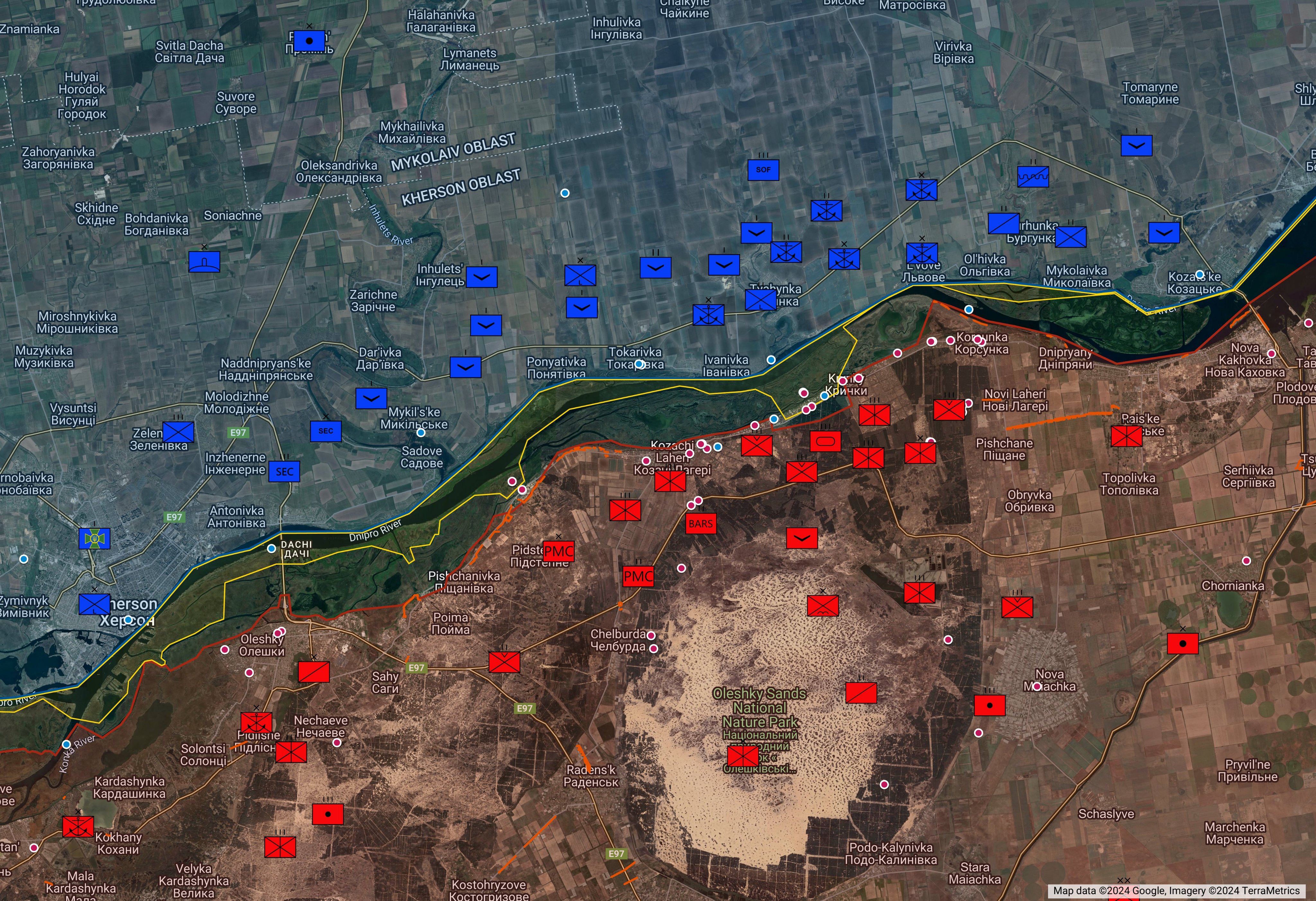
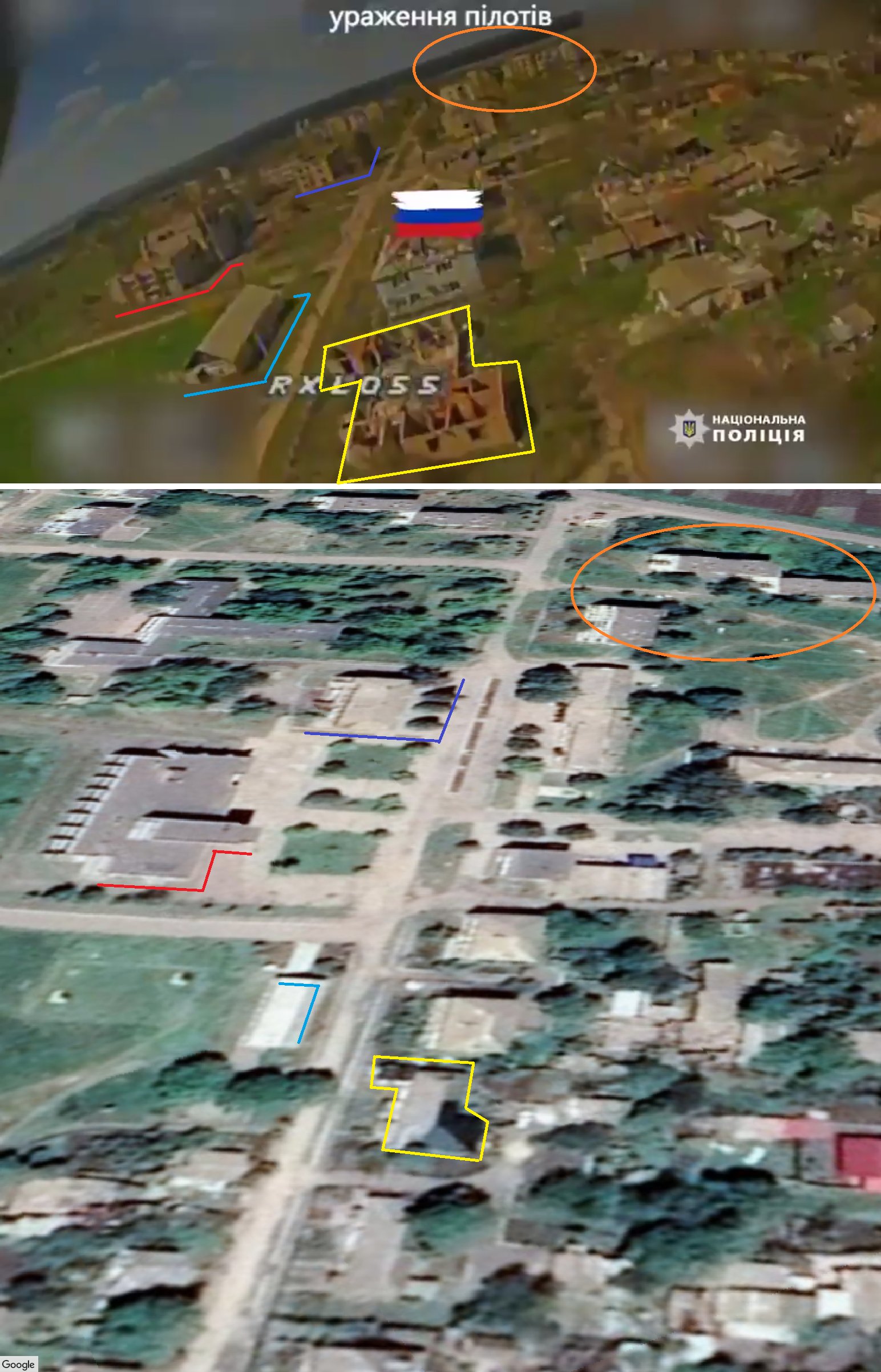 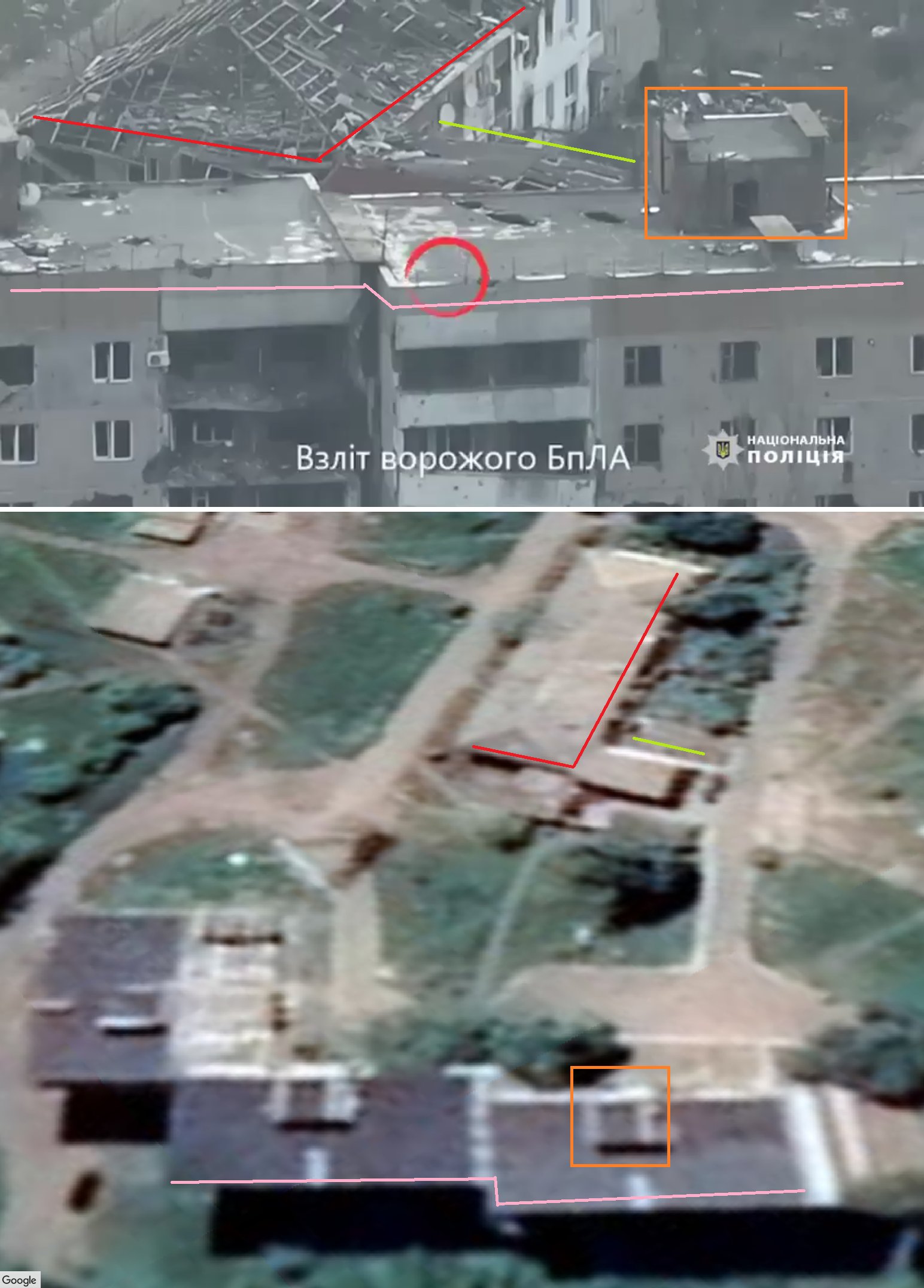
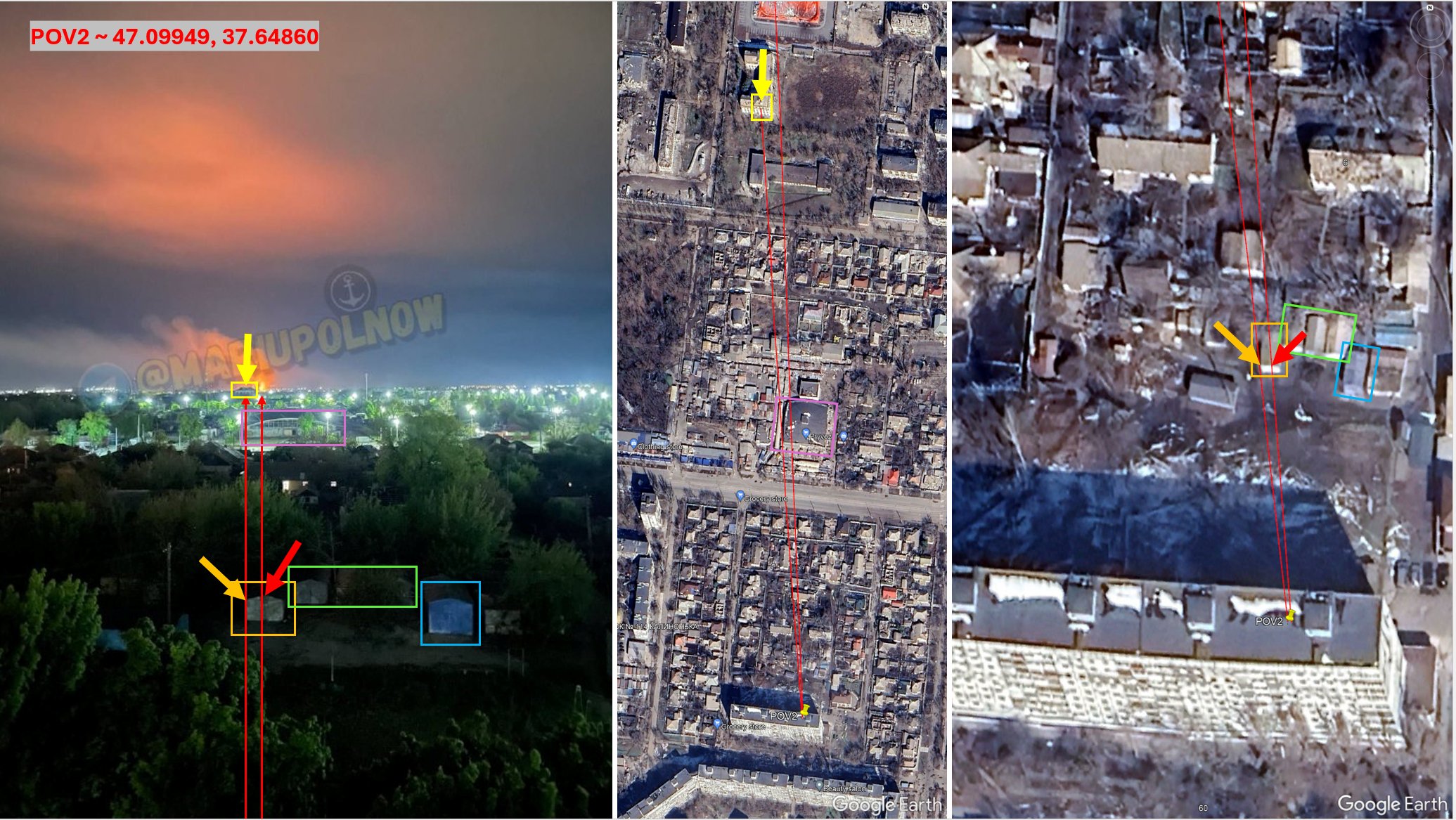
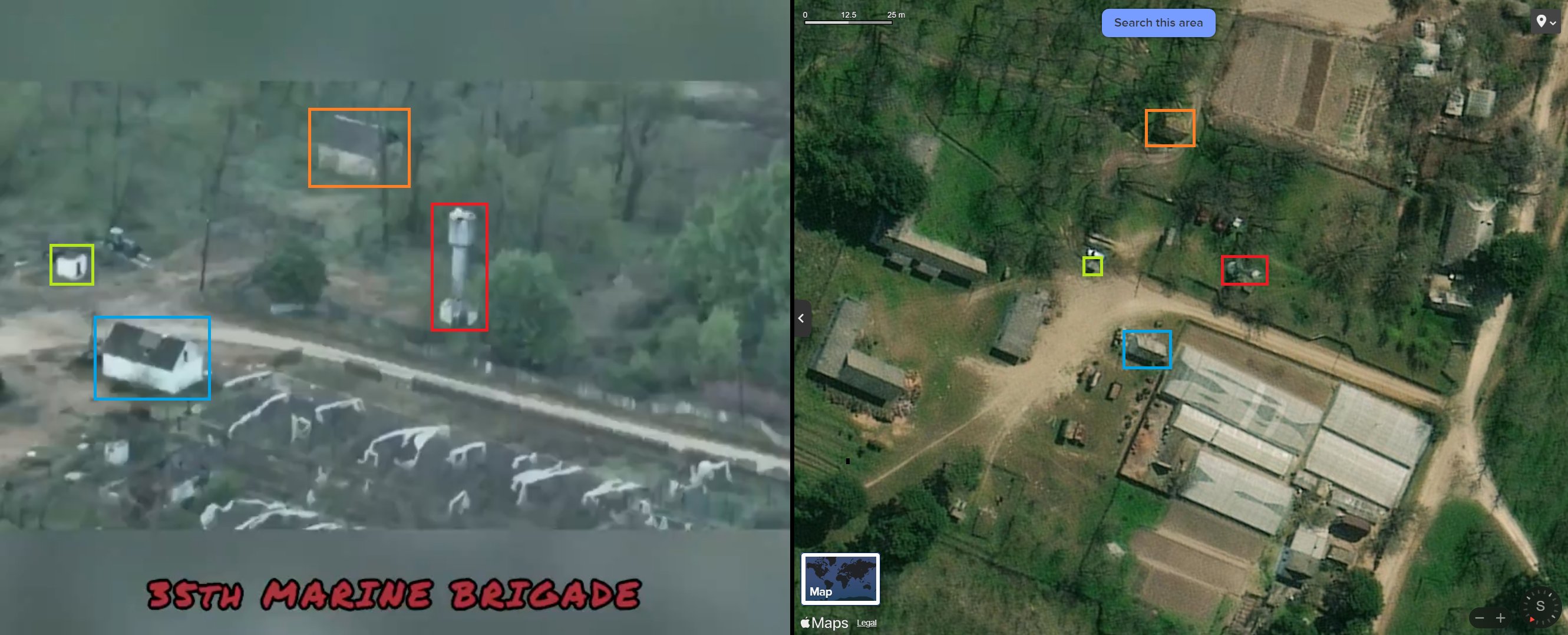 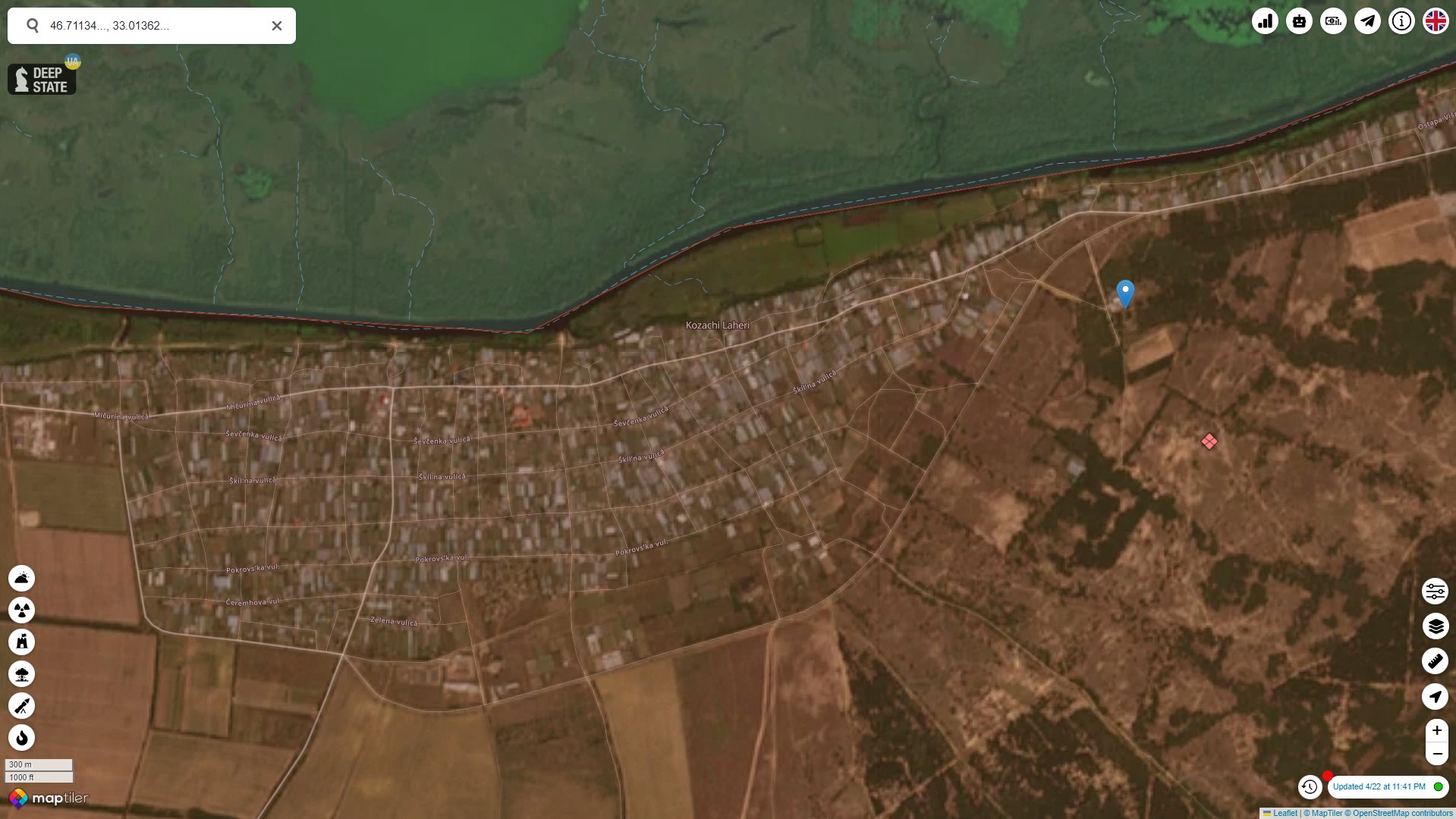

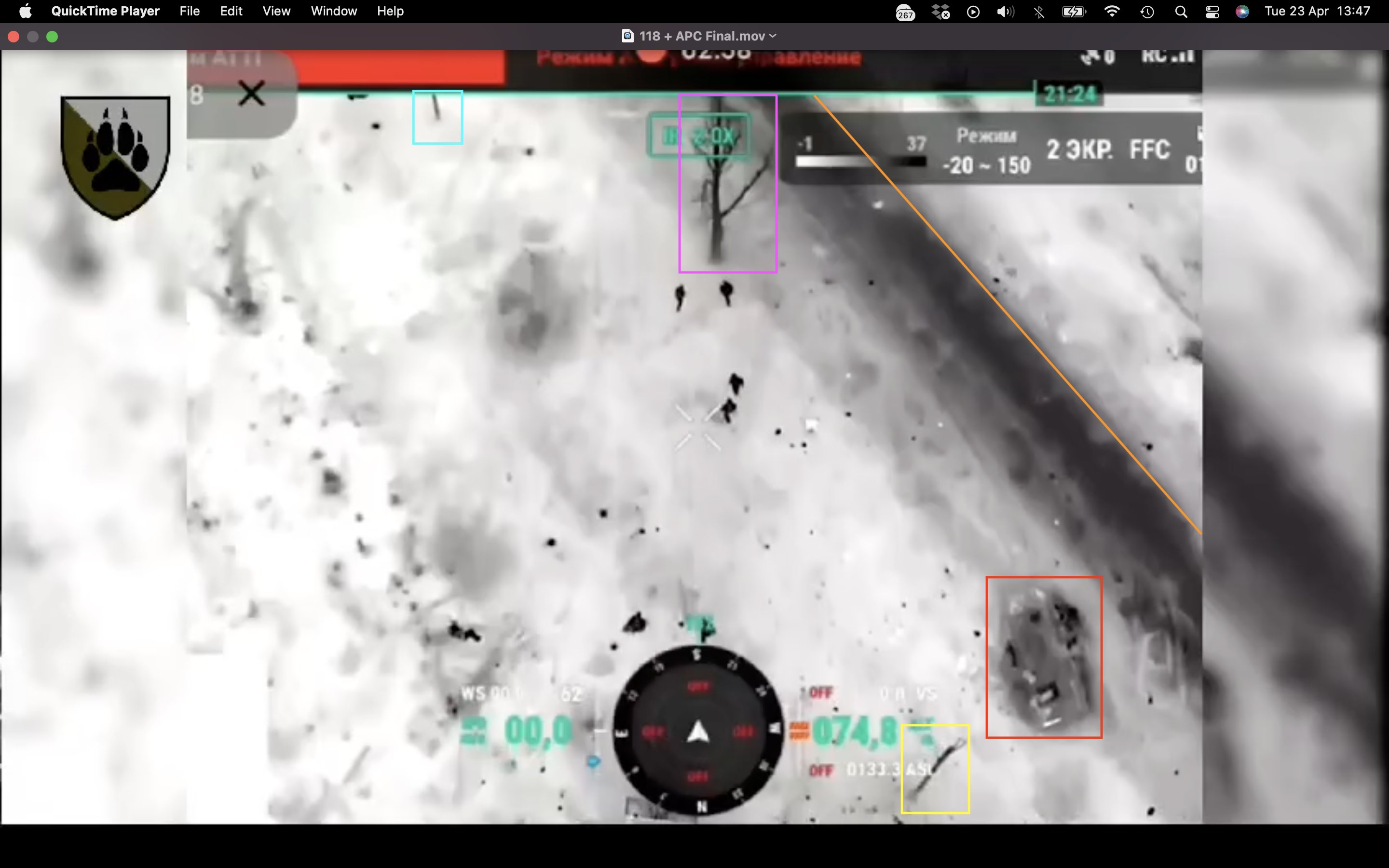 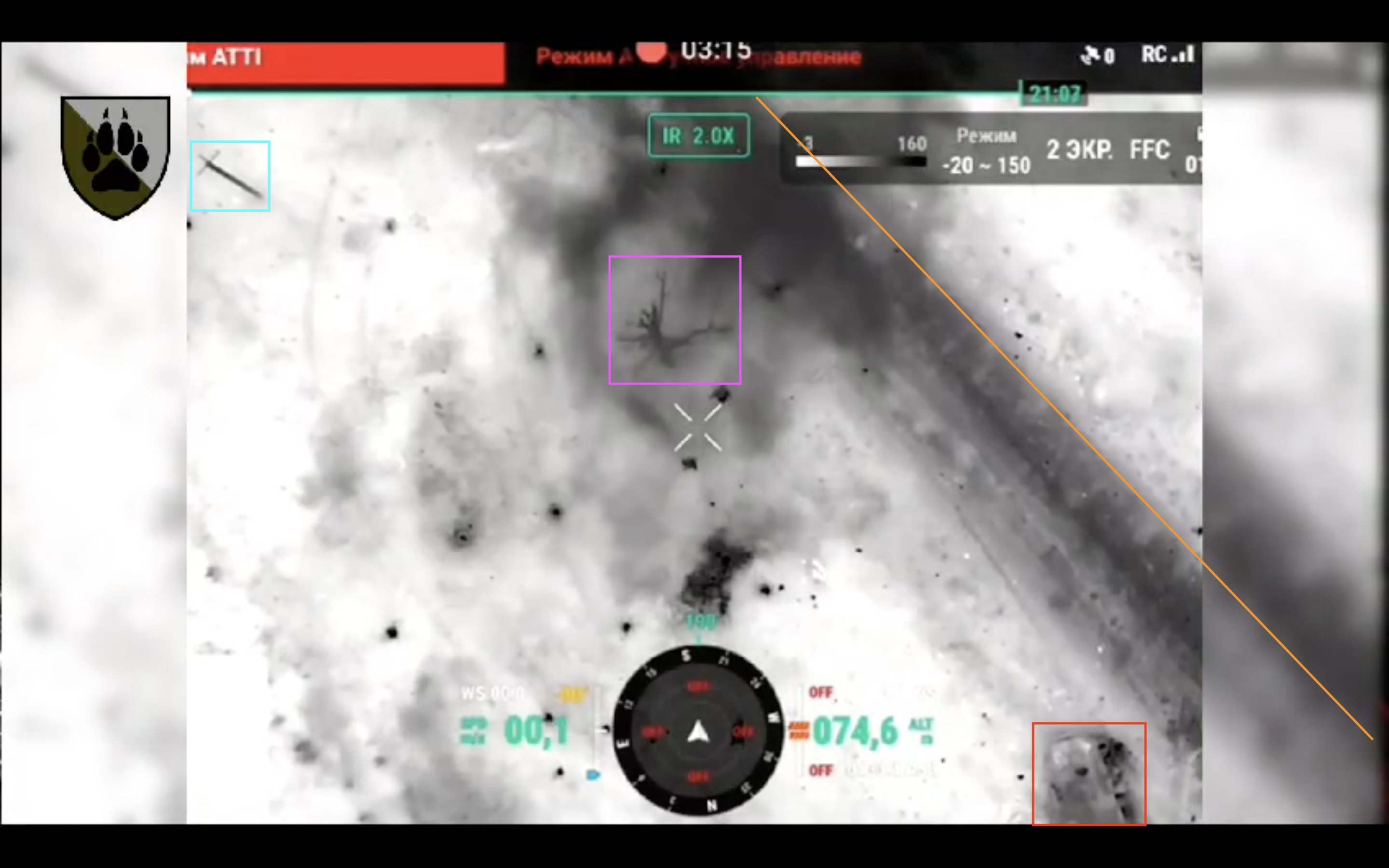 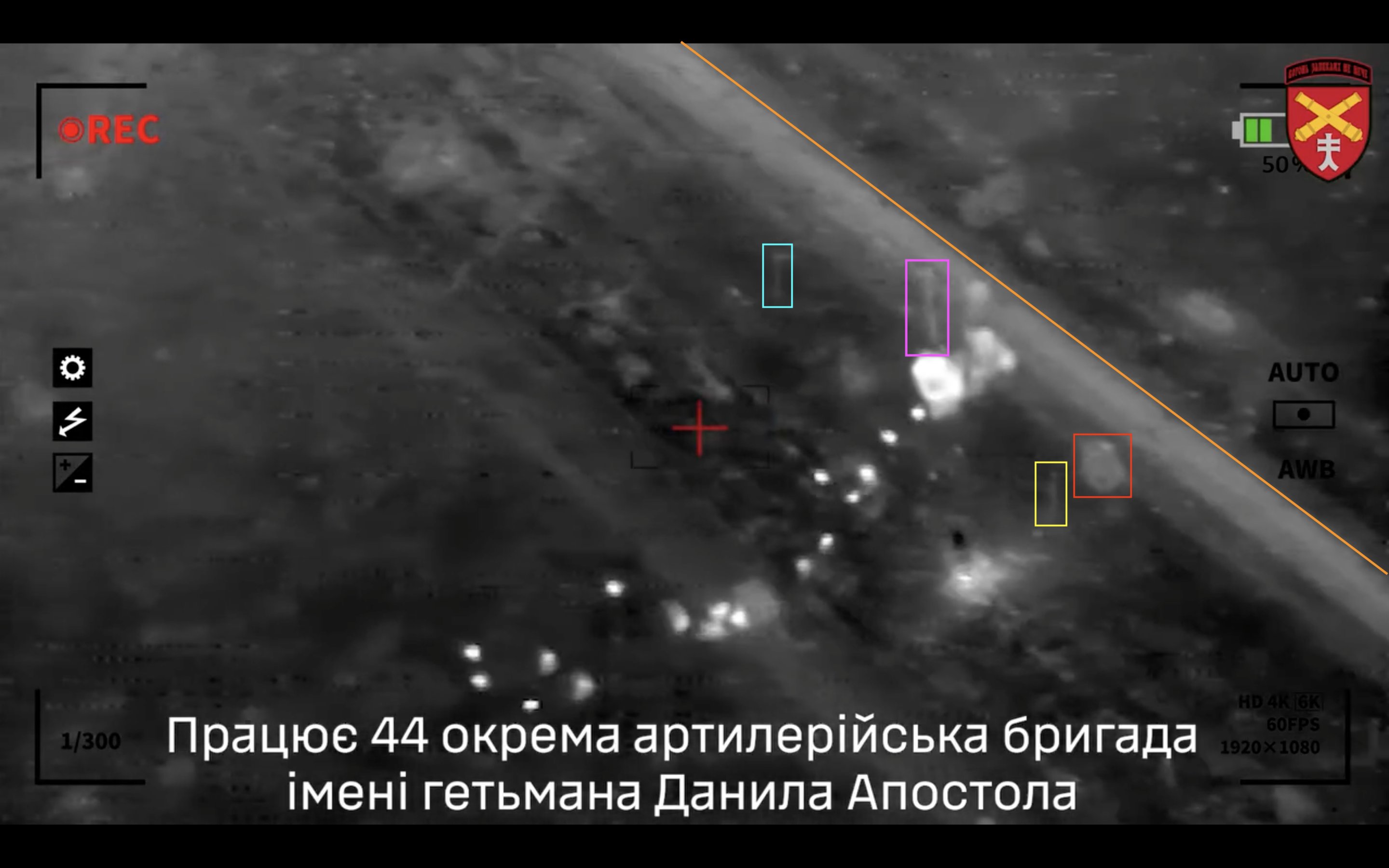 
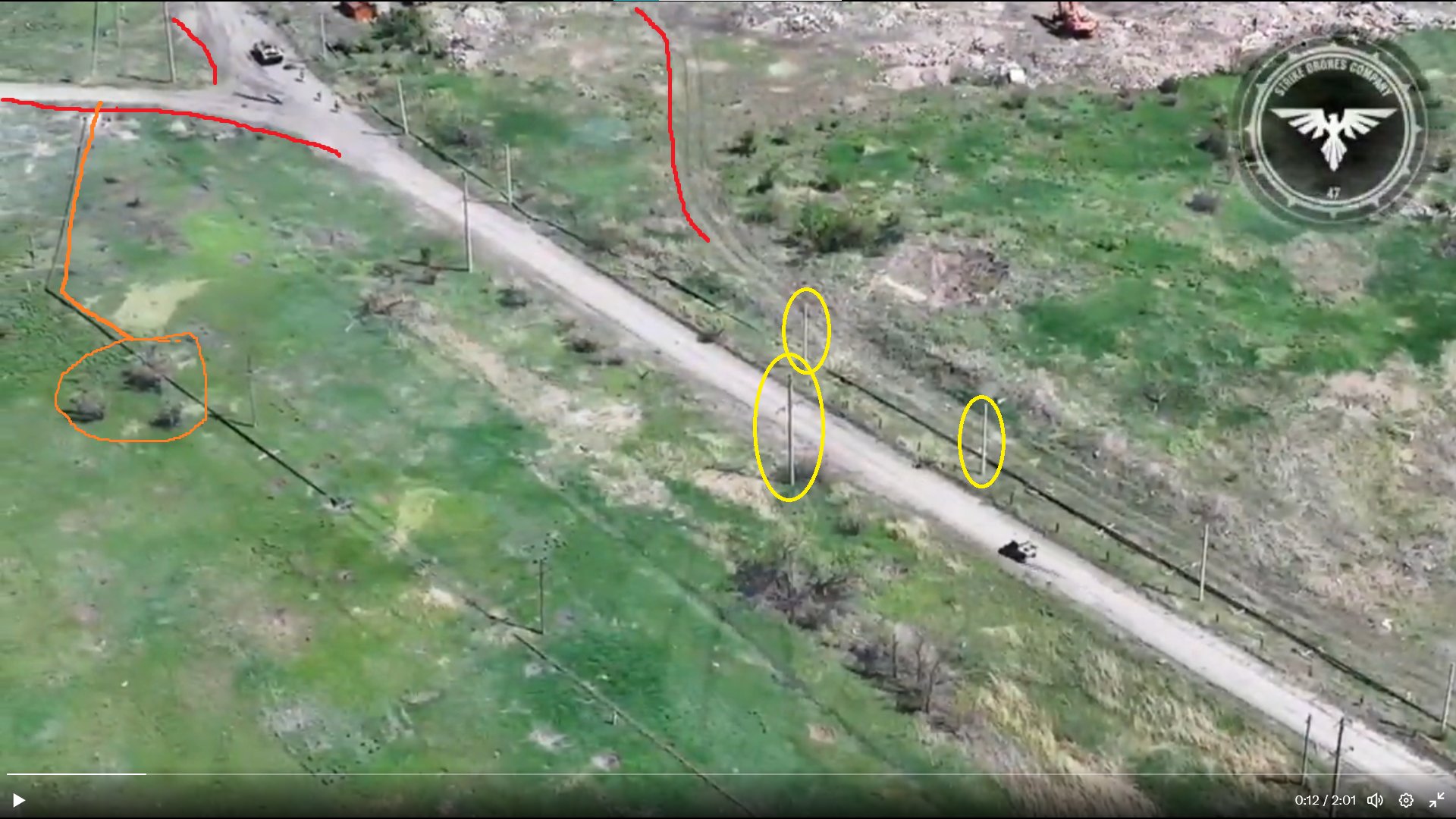 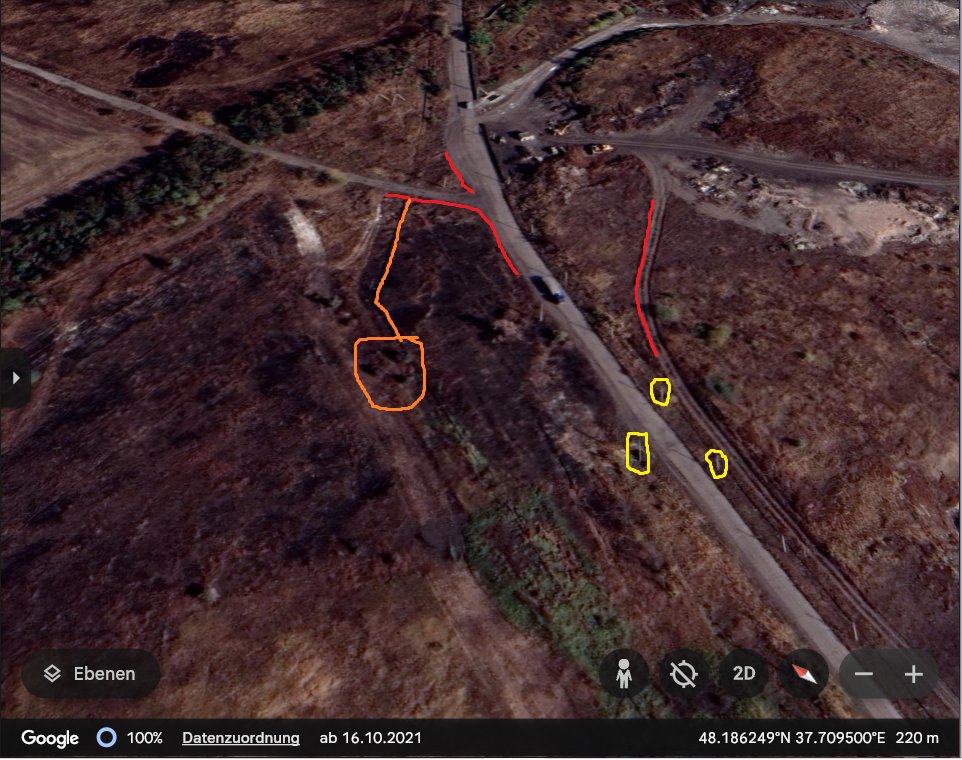
 View Quote 1/n Situation update from April 23, 2024, to the 790th day of #GuerreEnUkraine To the west of #Avdiivka , the first defensive line 🇺🇦 , which has just given way, has fulfilled its role: to gain time before the arrival of the cavalry (ie the help 🇺🇸 ) which is ready 👇
  |
|
|
“If by chance you were to ask me which ornaments I would desire above all others in my house, I would reply, without much pause for reflection, arms and books.”
Baldassare Castiglione https://t.me/arfcom_ukebros |

🇱🇻🇱🇹🇷🇺🇪🇪 In general, NATO countries have become noticeably more active in the Baltics. In addition to the two exercises already mentioned, the first phase of NATO's Ramstein Alloy event, which will last three days, also began yesterday. This is primarily a training aimed at assessing the readiness of NATO air defense and air defense assets on the northern and eastern flanks of the Alliance. The aircraft participating in the Baltic Air Policing mission are attracted to it. The exercise involves about 1.5 thousand military personnel and 25 aircraft, including F-16 fighters of the Portuguese Air Force, F-18 of the Spanish Air Force and Typhoons of the German Air Force, stationed at the Lielvarde and Zoknyai air bases. 🔻Moreover, for the first time, JAS-39 Gripen fighters from air bases in Sweden will take part in the events, for which the exercises will be the first in the status of already a NATO member. Finnish F/A-18 fighters are also expected to be deployed from Finland. Under the guise of testing the readiness of pilots for a sharp deterioration in the situation, pilots will be trained to conduct a joint operation against a mock enemy, which, obviously, is Russia. And the initial target is again Kaliningrad. https://t.me/rybar/59449 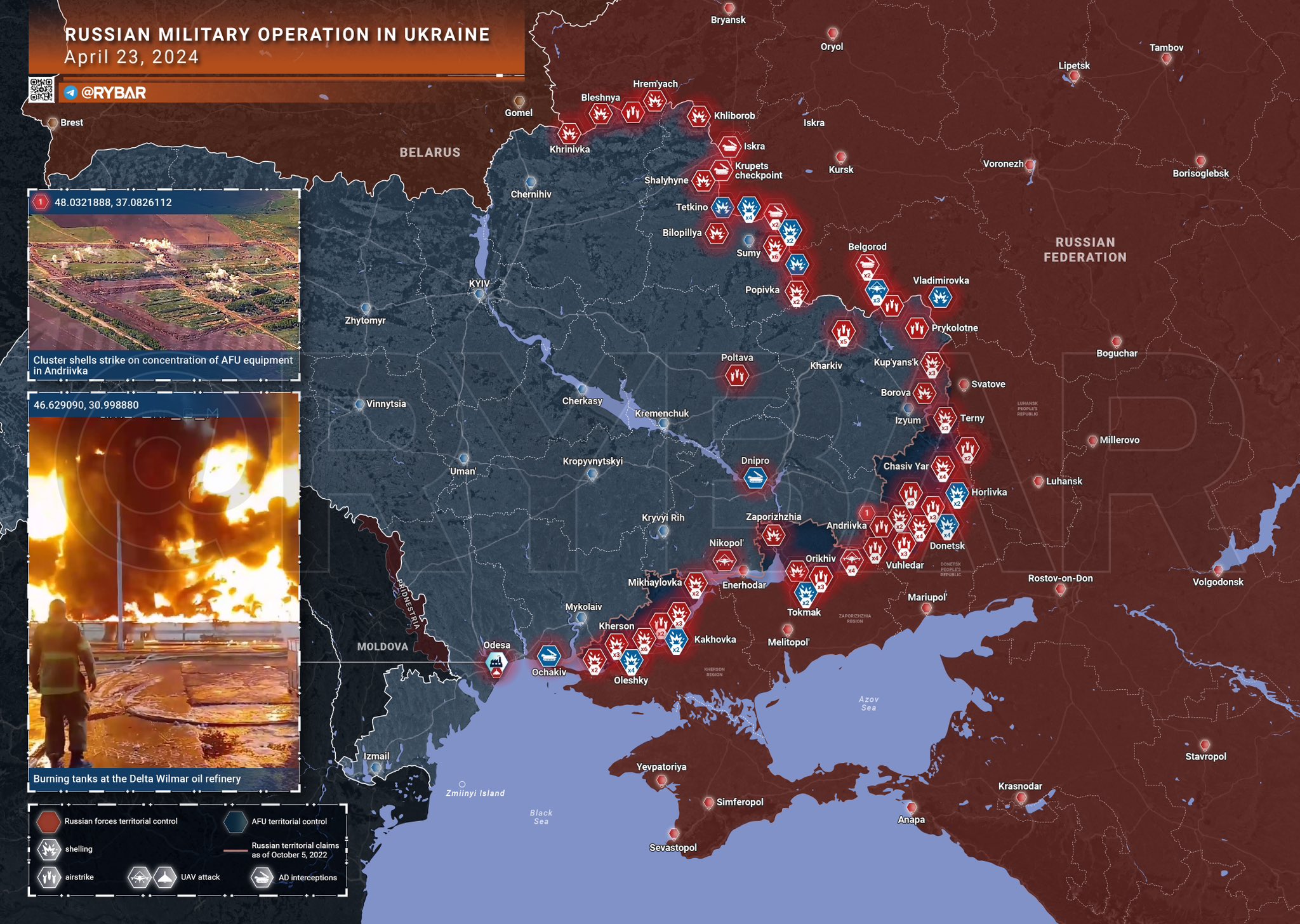 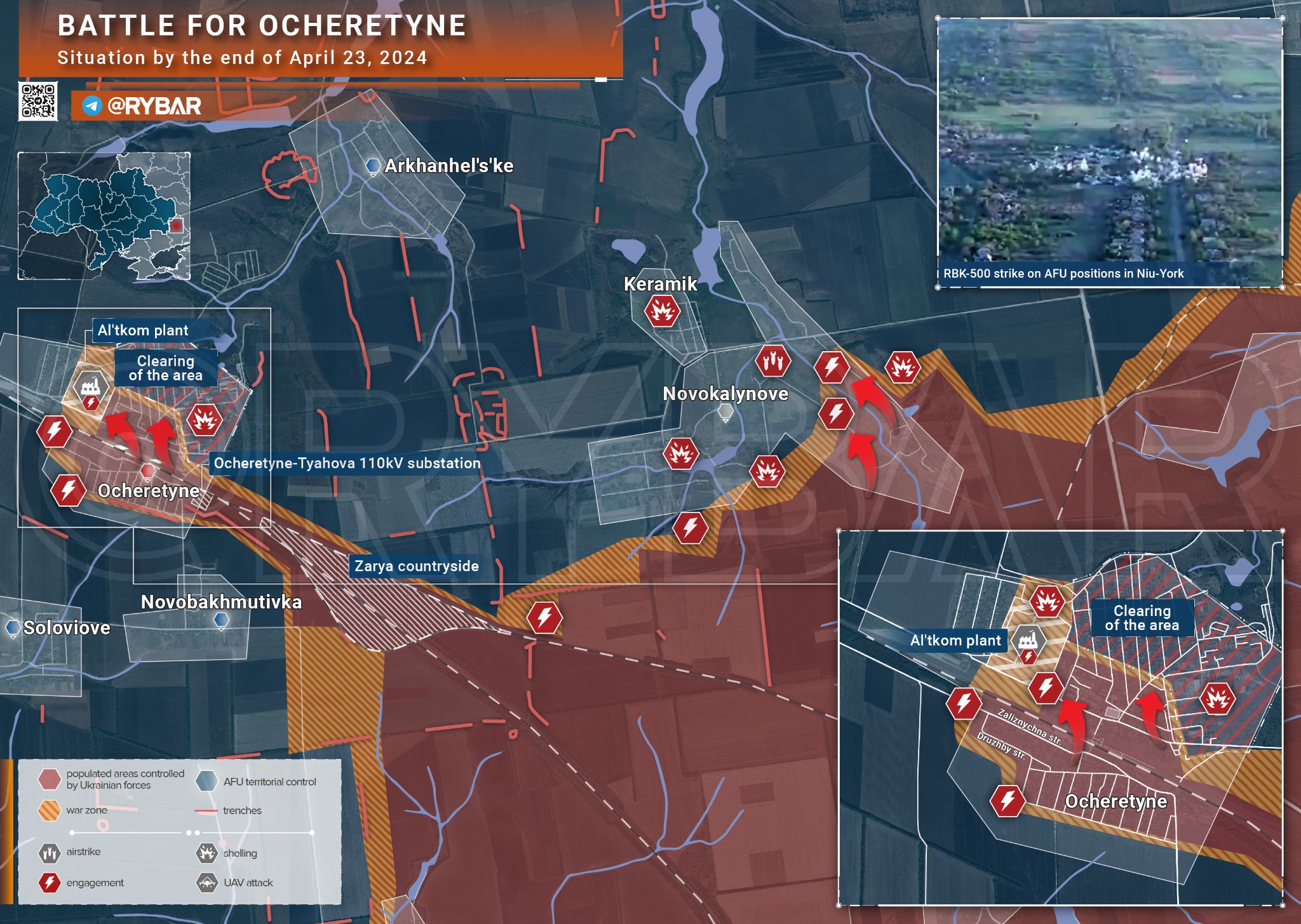 🇷🇺🇺🇦 Chronicle of a special military operation for April 23, 2024 Over the course of 24 hours, Russian troops launched missiles, glide bombs and kamikaze drone strikes against targets in Kharkov, Poltava, Odessa and Dnepropetrovsk. In the Bakhmut direction, Russian troops storm the Kanal microdistrict on the eastern outskirts of Chasov Yar. The enemy relies on a large number of defensive positions; dense mining of the approaches to the city makes it difficult for the Russian Armed Forces to advance. In the Avdeevsky direction there are battles in the central part of Ocheretino, Russian troops are clearing the northern outskirts of the village. By the evening, unconfirmed information appeared that Ukrainian formations had also begun to withdraw from Novobakhmutovka, located to the south. In the Ugledar direction, the assault groups of the Russian Armed Forces, after consolidating in Novomikhailovka, advance in the direction of Paraskovievka and Konstantinovka. Fighting continues in the nearby SNT Mashinostroitel. https://t.me/rybar/59451 |
|
|
“If by chance you were to ask me which ornaments I would desire above all others in my house, I would reply, without much pause for reflection, arms and books.”
Baldassare Castiglione https://t.me/arfcom_ukebros |
|
China’s three-legged race to fend off the 4 Ds of an economic apocalypse The dangers of debt, deflation, de-risking and demographics are at China’s doorstep, threatening growth in its US$17.67 trillion economy A property crisis, chilled consumption, weak momentum and a broad lack of confidence in the economic outlook do not bode well for a return to normality in 2024 Frank Chen in Shanghai Published: 10:00pm, 20 Jan 2024 China’s 5.2 per cent rise in gross domestic product (GDP) last year, despite beating its annual target and still well outpacing growth in developed Western countries, has yet to convince the market that all is well in the world’s second-largest economy, according to observers. And the race is on as policymakers grapple with the ramifications of four distressing “Ds” – debt, deflation, de-risking and demographics – that continue to bog down the 126-trillion-yuan (US$17.67 trillion) economy at the starting blocks of 2024. The race of key industries against plunging property Real estate, along with related sectors dealing in home appliances, construction and materials, used to account for about a quarter of China’s economic output. But the pillar industry fell fast in recent years, as evidenced by the debt crises at major property developers such as Evergrande and Country Garden, which owe millions to small companies and their workers. China’s property-development investments slumped 9.6 per cent last year, with the total area under construction dropping by 1.5 per cent and total sales falling 6.5 per cent to 11.66 trillion yuan. The added value of the real estate sector accounted for 5.8 per cent of the national GDP last year – a years-low, according to government data. “China is seeing a dual-track recovery,” said Yu Xiangrong, Citigroup’s chief Greater China economist, at a webinar this month. And he suggests that the contributions of three new powerhouses – technological innovation, advanced manufacturing and modernised infrastructure – could approximate that of the property sector. But for the pivot to a new growth model to take place, both the supply and demand sides would have to contend with “throes of a deep, profound change and transition”, he warns. The race of policy action against weak momentum Beijing has maintained a policy-loosening stance, but no “bazooka-style” stimulus is expected in 2024. Authorities have taken a variety of policy support steps since last summer, including an action plan for private and foreign investors, followed by the approval of 1 trillion yuan worth of special treasury bonds in October. These measures, however, have not yet translated into sustainable growth momentum. Sequential economic growth slowed to 1 per cent in the fourth quarter of 2023 from 1.5 per cent in the third quarter, according to the National Bureau of Statistics (NBS). Despite a push among local authorities to get their respective economies off to a strong economic start, many analysts expected a step-by-step easing approach because of debt and risk considerations. “Policy is moving slowly in this direction and will continue to edge closer,” wrote Rory Green, an economist at market-research firm TS Lombard. “There will be no bazooka, but a steady drip feed of increased bond issuance and PSL (pledged supplementary lending) will build through the year.” The race of business against faltering confidence Beijing has talked a lot about supporting private firms and welcoming foreign investors – with the latest comments coming days ago from Premier Li Qiang at the World Economic Forum in Davos, Switzerland. However, the latest NBS data indicates private investment fell by 0.4 per cent last year. Meanwhile, China’s foreign direct investment (FDI) totalled 1.1 trillion yuan in 2023 – down 8 per cent, year on year – according to commerce authorities. FDI to the manufacturing sector dipped 1.8 per cent while those to the service sector slumped 13.4 per cent. Analysts have warned that the government must make its messages more transparent and its actions more assertive. “The [Chinese] economy can’t afford successive years of a confidence crisis,” said Xu Tianchen, senior economist at the Economist Intelligence Unit. The delay of the Third Plenum, an occasion for the Communist Party leadership to address the nation’s long-term economic issues, also raised concerns about China’s policy direction. Debt burden weighs on local authorities and developers Local authorities across the country are now besieged by debt – a situation that worsened amid falling tax revenue and declining land sales in the first year of China’s post-pandemic recovery. The confirmed local debt amounted to 40.6 trillion yuan at the end of November, up 16 per cent, year on year, according to the Ministry of Finance. Meanwhile, the total debt size of local government financing vehicles was between 55 trillion and 65 trillion yuan in the third quarter of last year, according to Mizuho Securities Asia. Developers are now in survival mode, awaiting government funding to lift them out of the financial doldrums. Over the past two years, around 50 mainland developers have defaulted on about US$100 billion worth of offshore bonds, according to a JPMorgan report in December. Deflation fears must scare up support China’s consumer price index fell in December by 0.3 per cent, year on year, marking a third consecutive monthly decline. Upstream deflation pressure is more pronounced, as the producer price index fell for the 15th consecutive month in December and dropped by 2.7 per cent, year on year. Fears are intensifying that China may slip into a Japan-like spiral of stagnation. The deflationary pressure highlights the stubborn problem of inadequate domestic demand, which has worsened amid falling export orders. Yao Yang, director of Peking University’s National School of Development, said the deflationary pressure – despite monetary easing – means that the insufficient-demand problem remains severe, coupled with a supply-demand imbalance. The economist has called for demand-side reforms, such as direct subsidies to consumers, to boost demand, which had “nearly zero growth in the past three years”, he said at a seminar in Guangzhou last week. De-risking set to accelerate Speaking at a high-level financial conference on Tuesday, President Xi Jinping said China faces urgent tasks in its efforts to tackle various financial risks, and he ordered regulators to clarify their responsibilities and join hands in the nation’s de-risking campaign. “Financial regulation must have teeth,” he said. “All localities must plan for the overall situation based on one region and practise risk management and stability maintenance.” Beijing set up the Central Financial Commission in March as part of a financial overhaul to clamp down on risks. Preventing and resolving such financial risks is an “eternal theme” for the central government, according to comments that came from the twice-a-decade central financial work conference in late October. Demographic woes intensify The decline in China’s birth rate has accelerated rapidly, with its population shrinking by 2.08 million to 1.4097 billion last year, much steeper than 2022’s alarm-raising decrease of 850,000, which marked the first decline in six decades. Births in China dropped by 5.6 per cent to an all-time low of 9 million in 2023, after having already lost the title of the world’s most populous nation to India, according to United Nations data. Meanwhile, about 11 million Chinese people died in 2023, pushing the death rate to a five-decade high. The birth decline worsened despite Beijing effectively scrapping all birth-control rules and doling out pro-natal support in recent years for couples to raise bigger families. The knock-on effects of a shrinking population that is rapidly ageing means the nation’s long-touted demographic dividend has whittled away. And this is expected to have far-reaching implications for the labour supply, consumption, social security benefits and economic growth prospects for years to come. https://www.scmp.com/economy/china-economy/article/3249136/chinas-three-legged-race-fend-4-ds-economic-apocalypse View Quote |
|
|
“If by chance you were to ask me which ornaments I would desire above all others in my house, I would reply, without much pause for reflection, arms and books.”
Baldassare Castiglione https://t.me/arfcom_ukebros |
 |
|
|
“If by chance you were to ask me which ornaments I would desire above all others in my house, I would reply, without much pause for reflection, arms and books.”
Baldassare Castiglione https://t.me/arfcom_ukebros |
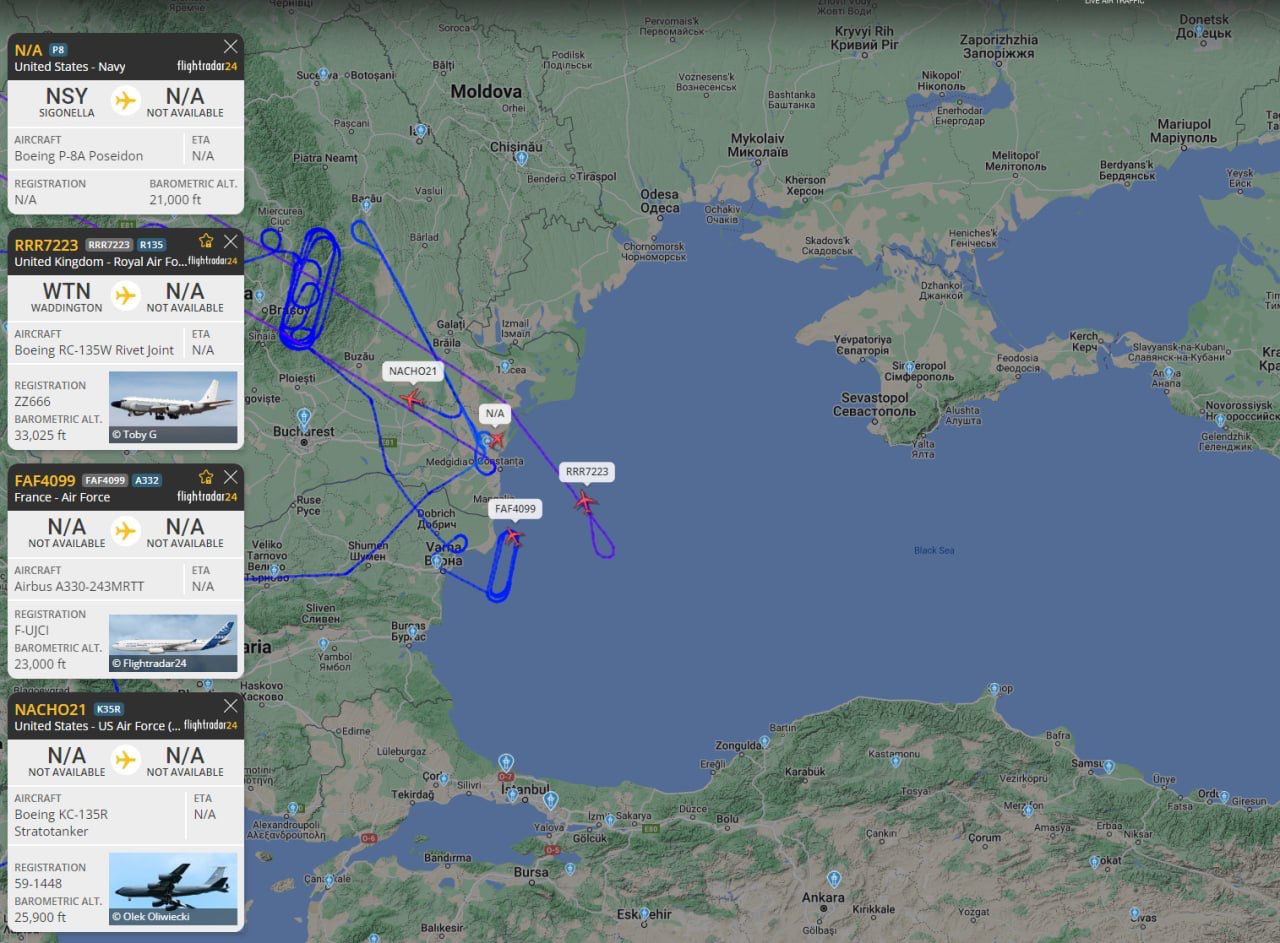 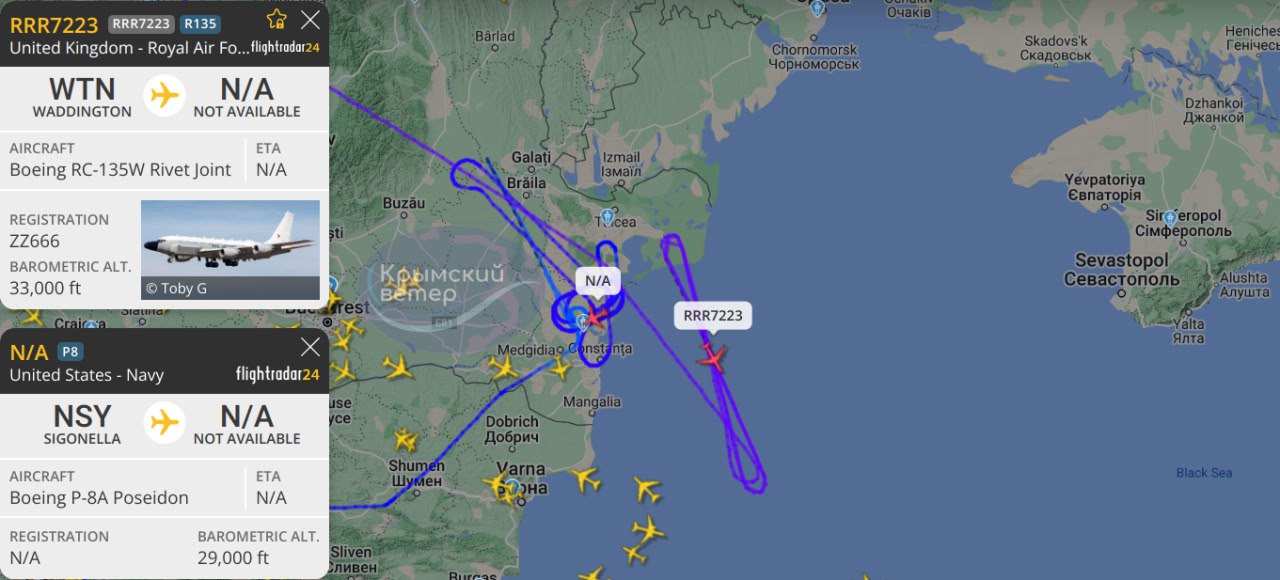 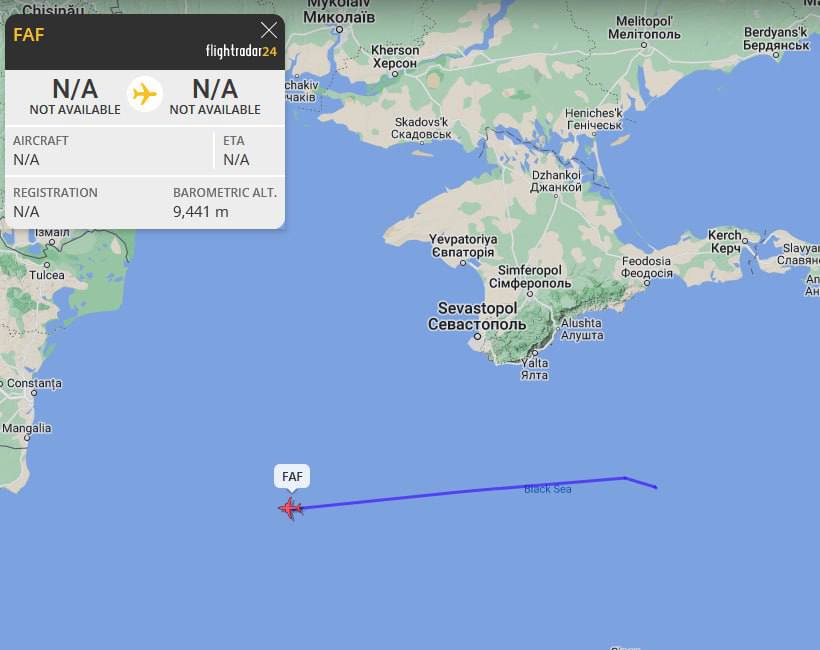
|
|
|
“If by chance you were to ask me which ornaments I would desire above all others in my house, I would reply, without much pause for reflection, arms and books.”
Baldassare Castiglione https://t.me/arfcom_ukebros |

|
|
|
|
|
In, just in case this thread delivers.
|
|
|
|
|
In unfortunately
|
|
|
|
|
Russian investigative committee detained Timur Ivanov, the Deputy Defence Minister and one of Shoygu's key allies, in a bribery case.
He controlled and was responsible for a large number of constructions for the army's benefit. In 2013 - 2016, he was the General Director of Oboronstroy, a conglomerate of companies involved in construction for the Russian Army. In May 2016 he was appointed Deputy Minister of Defense of the Russian Federation. Without Putin's sanction, such an arrest was impossible. Ivanov is one of Shoigu’s 12 deputies, he was responsible for buildings and structures for troops, the construction of fortifications and the "restoration" of occupied regions, as well as for medical support for the Russian Armed Forces. Among other things, he was responsible for the creation of the Main Cathedral of the armed forces, the Patriot park, the Vostochny cosmodrome, and after the full-scale invasion of Ukraine, for the project to restore occupied Mariupol. This is a sensitive attack against Shoygu. 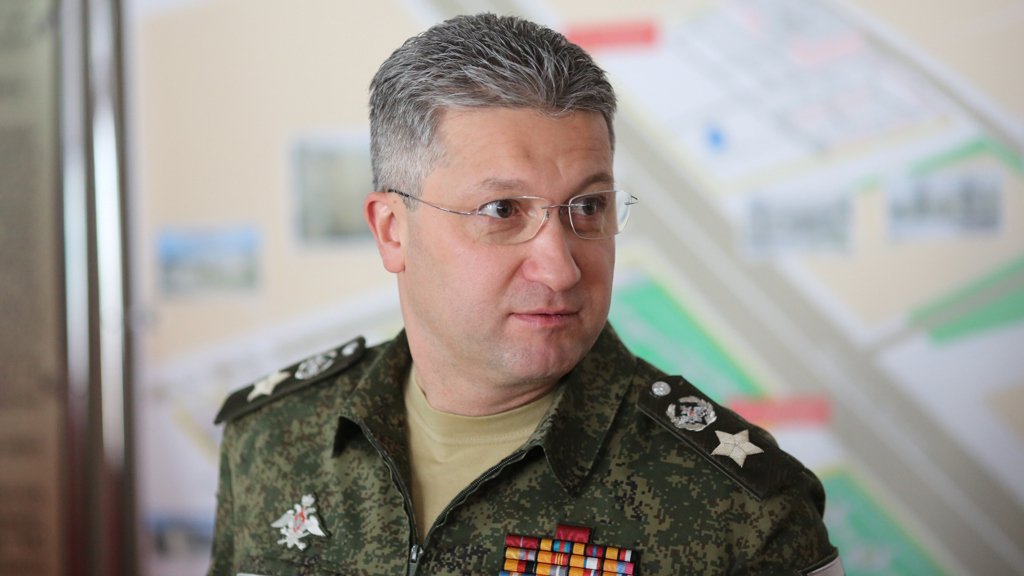 
Russia detains deputy defence minister over corruption suspicions MOSCOW: Russian law enforcement officers have detained Deputy Defence Minister Timur Ivanov on suspicion of taking bribes, Russia’s Investigative Committee said on Tuesday. President Vladimir Putin was informed of the detention of the high-ranking official, a rare move amid the offensive in Ukraine, Russian state-media reported. Anti-corruption activists have for years criticised what they call widespread corruption under Putin’s rule. “Deputy Minister of Defence of the Russian Federation Timur Vadimovich Ivanov has been detained on suspicion of committing a crime under Part 6 of Article 290 of the Criminal Code (taking a bribe),” the committee said on Telegram. The committee did not give any more details. The offence is punishable by a large fine or over a decade in prison depending on the details of the crime. Ivanov is already under sanction from the European Union as the defence ministry’s top official in charge of construction of military facilities. He was the subject of an investigation published in 2022 by the banned Anti-Corruption Foundation — created by late opposition leader Alexei Navalny. It said the deputy minister oversaw and allegedly profited from the construction projects in Ukraine’s Mariupol, which fell under Moscow’s control after a months-long siege. Published in Dawn, April 24th, 2024 https://www.dawn.com/news/1829306 Russia's Deputy Defense Minister Arrested on Suspicion of Accepting Bribe According to the TASS news agency, the office and residence of Timur Vladimirovich Ivanov are the subject of searches by the authorities Russian Deputy Defense Minister Timur Vladimirovich Ivanov has been detained on suspicion of accepting a bribe, Russia's Investigative Committee said Tuesday. "On suspicion of committing the crime contemplated in part 6 of art. 290 of the Criminal Code of Russia (collection of bribery), the Deputy Minister of Defense of the Russian Federation Timur Vladimirovich Ivanov was detained," the message reads. Ivanov, 48, is suspected of receiving a large bribe, a crime punishable by up to 15 years in prison. According to the TASS news agency, searches are being carried out at the detainee's office and place of residence. On Tuesday, Ivanov, who is in charge of construction issues, participated in a meeting of the Russian military leadership, which was chaired by the head of the Defense Ministry, Sergei Shoigu. In 2022, the outlawed Anti-Corruption Fund of the late Russian opposition leader Alexei Navalny denounced in one of its investigations the luxurious life of the Russian deputy minister both on Russian territory and in Europe. https://www.cronica.com.mx/mundo/detienen-viceministro-defensa-rusia-sospecha-aceptar-soborno.html Deputy Defense Minister Timur Ivanov was detained. Previously, the Dossier Center talked about his corruption schemes at Mariupol construction sites. The official telegram channel of the Investigative Committee reports about the detention of Ivanov. He is suspected of receiving a bribe on an especially large scale - part 6 of Article 290 of the Criminal Code of the Russian Federation. Last spring, we dedicated a major investigation to the Deputy Minister of Defense. We found out that although construction in occupied Mariupol is formally carried out by the state-owned Military Construction Company, the actual subcontractor at the sites is the private company Olimpsitistroy. “Timur feeds from two companies - contractors of the Ministry of Defense, these are Olimpsitistroy and Zapsibgazprom,” a source who had previously been friends with Ivanov and his ex-wife Svetlana Maniovich told us then for many years. Calculations by the Dossier Center have shown that construction projects in Mariupol and other occupied territories, even legally, can cost the budget 3-4 times more expensive than in the neighboring Rostov region. This is due to the multiplying factors associated with war. It is also easy to hide theft at these construction sites. Another Dossier interlocutor is former military builder Sergei Khrabrykh. According to him, Timur Ivanov introduced the practice of “homework” for Defense Ministry contractors. This meant a kickback, which was discussed along with advance payments and other terms of the contract. Timur Ivanov is a very pro-Western person, the Dossier source also said. In August 2016, already being Deputy Minister of Defense and having the first form of secrecy, prohibiting trips to NATO countries, he managed to celebrate his birthday on the Cote d'Azur in France. Ivanov’s detention is a blow to Defense Minister Sergei Shoigu, who is considered his main patron. Ivanov achieved this favor by carrying out delicate assignments: for example, paying for publications glorifying Shoigu with black cash - money from the very “homework” of Defense Ministry contractors. https://dossier-center.appspot.com/ter-ivanov/ (without VPN) https://dossier.center/ter-ivanov/ (with VPN) https://t.me/dossiercenter/325
|
|
|
“If by chance you were to ask me which ornaments I would desire above all others in my house, I would reply, without much pause for reflection, arms and books.”
Baldassare Castiglione https://t.me/arfcom_ukebros |
|
Ad Lucem: Towards Light
This information is a general statement of law and procedure and not a substitute for specific legal advice from a licensed attorney in your jurisdiction. |
|
Era of Wars Could Complicate Modi’s Moment
Unlike on Ukraine, in the Israel-Gaza conflict, India has been rendered an outlier in the developing world, where most countries are in solidarity with Palestine. Voting in India’s multiphase general elections is in progress, and Prime Minister Narendra Modi and his Bharatiya Janata Party (BJP) are vying for a single-party majority in Parliament for a third consecutive term. Although a significant part of the BJP’s campaign is predicated on the religious tempers that have vitiated India’s domestic politics, Modi’s appeal is also based on the promise that he can restore India to power and glory on the world stage. To that end, Modi and the BJP have been showcasing his government’s record in foreign policy. In one speech, Modi’s close aide and Home Minister Amit Shah said, “These elections are to make India a completely developed nation, and to make Bharat Mata (Mother India) a Vishwa Guru (world teacher).” Yet, the world is increasingly rife with conflict, complicating India’s designs for global power. In recent weeks, Iran and Israel have traded missile strikes, keeping much of the Middle East on edge. That conflict continues to fester after lawmakers in the United States House of Representatives cleared a fresh slate of military aid to Israel over the weekend. Last week, Iran seized a merchant ship with 17 Indian crew members from the Strait of Hormuz, claiming that it was linked to Israel. New Delhi has since been engaged in intense negotiations with Tehran, resulting in the release of one crew member. Even before Iran seized the merchant vessel, New Delhi was concerned about the economic repercussions of the widening war. Much of India’s energy supply and trade interests run through the Strait of Hormuz and the Red Sea, where Yemen’s Houthi rebels have attacked several shipping vessels in solidarity with Gaza. Disruptions to that trade could drive inflationary pressures in India’s economy. In addition, India is also increasingly worried about the future of its critical connectivity initiatives in the region — in particular, the India-Middle East-Europe Economic Corridor (IMEC), which was launched during last year’s G20 Summit in New Delhi. But aside from these obvious economic risks, India also faces a larger, more enduring risk that goes beyond the current war in Gaza: establishing itself as an influential voice in a world where geopolitical warmongering is the new normal. India increasingly risks getting drowned out amid the din. This month, U.S. National Security Adviser Jake Sullivan canceled a planned trip to India, where he was due to review progress on the flagship India-U.S. initiative for Critical and Emerging Technologies (iCET). This was the second time this year that Sullivan had canceled a trip to India. In February, he was scheduled to visit New Delhi for the annual Raisina Dialogue and a review of iCET. On both occasions, Washington cited the wars in Ukraine and the Middle East as the primary reason for the cancellation of his visit. Although the White House took pains to clarify the significance of the India relationship, the message was still awkward: There are other urgent priorities and India can wait. The proliferation of wars and global instability therefore presents India with two major challenges: one, creating jobs for its massive youth population in an age where trade, immigration, and energy supplies are increasingly volatile; and two, establishing global relevance for itself while remaining neutral on the world’s dominant geopolitical crises. On Ukraine, New Delhi had managed these competing imperatives fairly well, but it was also helped to some extent by the nature of that conflict. Large parts of the Global South were skeptical of Western appeals for the isolation of Russia and saw tinges of a Eurocentric worldview in that narrative. India’s External Affairs Minister Subrahmanyam Jaishankar had ridden that wave well by admonishing the West for its interventions in Asia and Afghanistan. “Europe has to grow out of the mindset that Europe’s problems are the world’s problems but the world’s problems are not Europe’s problems,” he once said. These arguments had played well with much of the developing world, which saw India’s strengthened economic ties with Russia as strategic cover for their own engagement with Moscow. Yet, on Gaza, India has been rendered an outlier in the developing world, where solidarity with Palestine has long been a norm. Anti-Israel protests have dominated discourse across much of the Global South, as narratives of a lopsided war have appalled the public imagination. The country that has led the multilateral effort against Israel for its alleged war crimes is South Africa — a key Indian ally in the developing world. Things haven’t necessarily been easier in relations with the West. If Washington was peeved at New Delhi’s show of neutrality on Ukraine, it should have been pleased by India’s more full-throated support for Israel. Yet, Sullivan’s postponed visits serve to demonstrate a starker problem: By lacking the presence and leverage to influence either party in the war, India is struggling to carve a relevant niche for itself or assert its power. Modi wants to establish India as a leading global voice while remaining strategically silent on the world’s geopolitical conflicts. It is becoming increasingly difficult to achieve those objectives together. https://thediplomat.com/2024/04/era-of-wars-could-complicate-modis-moment/ |
|
|
“If by chance you were to ask me which ornaments I would desire above all others in my house, I would reply, without much pause for reflection, arms and books.”
Baldassare Castiglione https://t.me/arfcom_ukebros |
|
Those three are certainly the front runners. I’m sure Kim Jong Un wishes it were more than a triumvirate; possibly a few African players as well.
I guess in on one with effectively no substance to contribute OP. |
|
|
Knight of Blunder - Fogo '21
|
|
Not polite delete
|
|
|
|


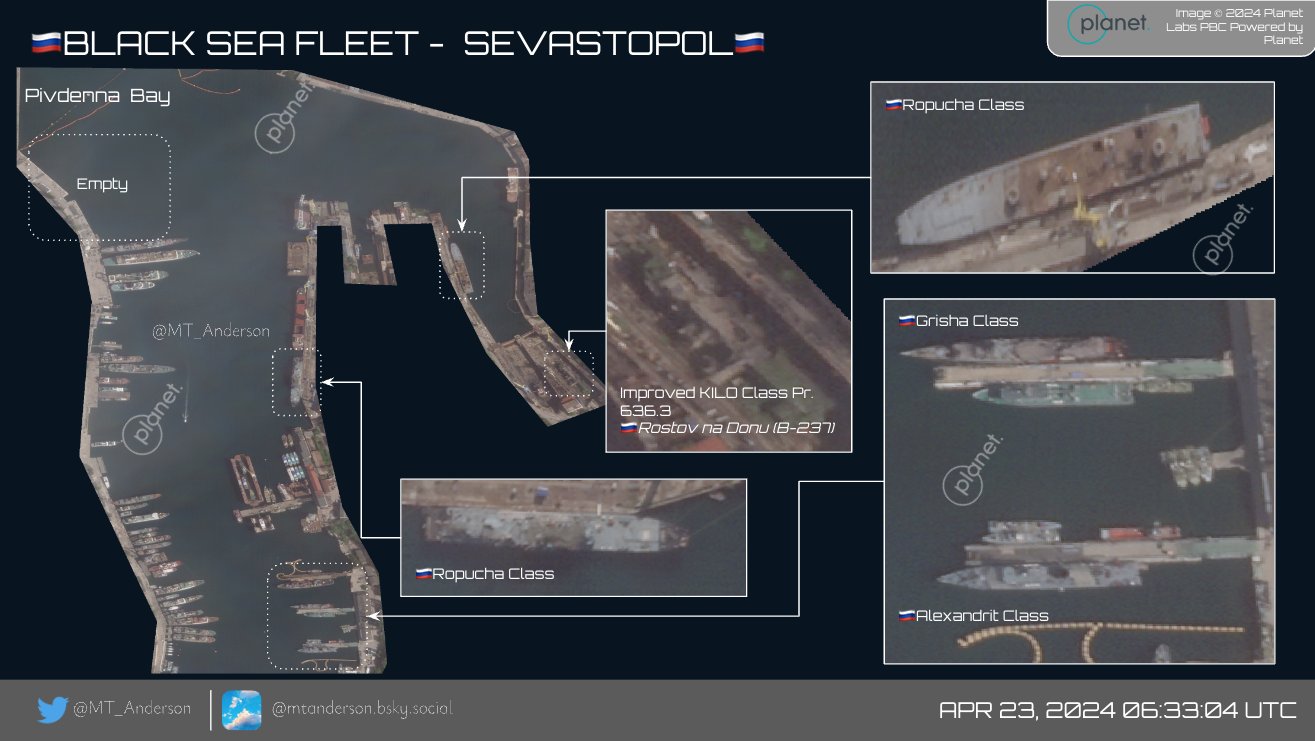
|
|
|
“If by chance you were to ask me which ornaments I would desire above all others in my house, I would reply, without much pause for reflection, arms and books.”
Baldassare Castiglione https://t.me/arfcom_ukebros |
|
I heard a blurb on the radio that Russia said they would start targeting more logistic bases, particularly the ones storing Western equipment.
|
|
|
|
|
Originally Posted By JLAudio: Is this the thread that demands American taxpayers deal with the increased debt and devaluing of our money due to the inflation related to sending hundreds of billions of dollars (which used to account for the entire US budget) overseas to non-allied and foreign countries to combat The New Red Threat™ ? If so, I'm in. /media/mediaFiles/sharedAlbum/l6I8mJU__1_-92.gif View Quote the debt spiral is why the crisis is happening |
|
|
|
|
|
|
Dont forget Best Korea and Cuba
They likey the pootin xi cum mustache bigtime Eta: In before GD'd resident pootin Ball Fondlers! |
|
|
|
|
💥 At 01:20 at least 12 explosions were heard in Mariupol and the surrounding area. Heard all areas of the city and the coast. It is also reported that raskat could be heard as far as Berdyansk. At the same time, a missile threat to the south was announced, but no air warning signals were sounded (which is, in principle, the norm for Russians).
No arrivals have been recorded in the city, but the issue of the district remains open. We are trying to establish the reason. Half an hour after the explosions, the Russian monitoring public reported on the "operations of Tornado-S with missiles with a range of up to 300 km. along Kurkhovo". Initially, the information looks like another "soothing" from the "burning kamish" series. However, right now the details are unknown. Some of our observers allow possible launches from ships in the Sea of Azov, this can explain such a wide spread of sound. However, again - the question needs additional clarification regarding the type of weapon that could be used. The most likely option remains a series of arrivals. Therefore, all the details later.. https://t.me/andriyshTime/20997 |
|
|
“If by chance you were to ask me which ornaments I would desire above all others in my house, I would reply, without much pause for reflection, arms and books.”
Baldassare Castiglione https://t.me/arfcom_ukebros |
|
Starting off the thread with some longer-format source videos. Some cover particular topics, some provide sources you should follow regularly for excellent coverage of the overall situation, beyond what you might find on the news or even here. I’ve listened to all of these regularly - highly recommended.
First, a series of videos by Dr. Timothy Snyder, expert on Russian and Ukrainian studies. Very, very long college-level class on the History of Ukraine. Extreme commitment of time but also extreme benefit. Doesn’t try to oversimplify the situation, presents warts and uncertainties and all. Good listen in your commute for a few weeks or months:  Timothy Snyder: The Making of Modern Ukraine. Class 1: Ukrainian Questions Posed by Russian Invasion The Holodomor - Russian genocide in Ukraine - 1930s on.  The Holodomor—A Look Back at Stalin’s 1932-33 Genocide in Ukraine. Lecture by Prof. Timothy Snyder. Does Russia intend genocide in Ukraine? (Yes)  ??Timothy Snyder: 6 steps to prove Russian genocide in Ukraine. Putin and Hitler act similarly Vladimir Putin’s relationships with US presidents over his 30-year reign  Putin and the Presidents: Timothy Snyder (interview) | FRONTLINE On western dithering/foot-dragging and the serious problems this may create in Ukraine and beyond:  The Peril of Slowness: American Mistakes during Russia’s War of Aggression in Ukraine Discussion about Russia and the West and their slide away from democracy and toward soft fascism  Timothy Snyder: "The Road to Unfreedom: Russia, Europe, America" Now, the ongoing series I suggest: Ukraine the Latest. UK source, consistently excellent material, in depth coverage from sources in the EU and NATO. Highly recommended.  Zelensky praises US for confronting "Russian evil" as Ukraine aid bill passes | Ukraine: The Latest Silicon Curtain. UK source. One-man podcast, frequently lines up veteran professionals in the European military/security/diplomatic establishments who really know their stuff. Probably more so that Ukraine the Latest, this podcast gets across that the European and global security situation is far more serious than most acknowledge. Doesn’t pull many punches. This episode covers the Global instability and insecurity which will come out of the Ukraine war.  Michael Kimmage - Putin's War in Ukraine Ushers in a New Age of Global Instability and Confrontation Perun. Focuses on defense economics, probably the best source for well-researched insights into production, high-level defense policy, and so on. Usually excellent quality content applicable to the war in Ukraine and the Russia/Iran/China axis. Worth binge watching.  Rebuilding US Arms Production - Can a new Strategy Restore the Arsenal of Democracy? DWNews. German English-language news. Provides good context for German political decision-making regarding the Ukraine war, occasional China material. Latest episode discusses the European security problems coming out of the Ukraine war.  'What is happening in Ukraine has ramifications far beyond the borders of our country' | DW News France24. French English-language news. Latest one covers the ongoing arrests of Chinese spies within the EU and German Parliament. Also occasionally covers French interests in Africa.  Blinken heads to China amid wave of arrests of suspected spies in Europe • FRANCE 24 English |
|
|
|
|
A large fire occurred near the Mill Plant in Kemerovo: the area exceeded 600 square meters
Ministry of Emergency Situations: the fire area near the Melkombinat exceeded 600 square meters in Kemerovo There was a fire in Kemerovo, eyewitnesses reported in the Kuzbass Incident public page . Citizens filmed thick smoke rising high into the sky. Heavy smoke was noticed on Kuznetsky Prospekt, in the Melkombinat area. The Kuzbass Emergency Situations Ministry provided A42.RU with operational information about the emergency. The fire occurred in a warehouse building: the signal was received at 10:06. The fire area exceeded 600 square meters. m. Five units of equipment are working on site. The fire has been localized. Other details are being confirmed. https://gazeta.a42.ru/lenta/news/186154-krupnyi-pozar-proizosyol-okolo-melkombinata-v-kemerove-ploshhad |
|
|
“If by chance you were to ask me which ornaments I would desire above all others in my house, I would reply, without much pause for reflection, arms and books.”
Baldassare Castiglione https://t.me/arfcom_ukebros |
|
As Blinken Heads to China, What’s on the Agenda?
China’s support for Russia will be a primary topic, along with war in the Middle East and tensions over Taiwan and the South China Sea. U.S. Secretary of State Antony Blinken is starting three days of talks with senior Chinese officials in Shanghai and Beijing this week with China-U.S. ties at a critical point over numerous global disputes. The mere fact that Blinken is making the trip – shortly after a conversation between U.S. President Joe Biden and Chinese leader Xi Jinping, a similar visit to China by Treasury Secretary Janet Yellen, and a call between the U.S. and Chinese defense chiefs – might be seen by some as encouraging, but ties between Washington and Beijing are tense and the rifts are growing wider. From Russia and Ukraine to Israel, Iran, and the broader Middle East as well as Indo-Pacific and trade issues, the United States and China are on a series of collision courses that have sparked fears about military and strategic security as well as international economic stability. Blinken “will raise clearly and candidly our concerns” during the talks starting Wednesday, a senior State Department official said. Here’s a look at some of the key issues Blinken is expected to bring up on the trip: Russia-Ukraine War The Biden administration has grown increasingly concerned in recent months about Chinese support for Russia’s defense industrial base, which U.S. officials say is allowing Moscow to overcome Western sanctions imposed after its invasion of Ukraine and resupply its military. U.S. officials say this will be a primary topic of conversation during Blinken’s visit. While the United States says it has no evidence China actually is arming Russia, officials say other activities are potentially equally problematic. “If China purports on the one hand to want good relations with Europe and other countries, it can’t on the other hand be fueling what is the biggest threat to European security since the end of the Cold War,” Blinken said last week. China says it has the right to trade with Russia and accuses the United States of fanning the flames by arming and funding Ukraine. “It is extremely hypocritical and irresponsible for the U.S. to introduce a large-scale aid bill for Ukraine while making groundless accusations against normal economic and trade exchanges between China and Russia,” Foreign Ministry spokesperson Wang Wenbin said Tuesday in Beijing. A senior State Department official said Friday that “through Chinese support, Russia has largely reconstituted its defense industrial base, which has an impact not just on the battlefield in Ukraine but poses a larger threat, we believe, to broader European security.” Middle East Tensions U.S. officials, from Biden on down, have repeatedly appealed to China to use any leverage it may have with Iran to prevent Israel’s war against Hamas in Gaza from spiraling into a wider regional conflict. While China appears to have been generally receptive to such calls – particularly because it depends heavily on oil imports from Iran and other Mideast nations – tensions have steadily increased since the beginning of the Gaza war in October and more recent direct strikes and counterstrikes between Israel and Iran. Blinken has pushed for China to take a more active stance in pressing Iran not to escalate tensions in the Middle East. He has spoken to his Chinese counterpart, Wang Yi, several times over the past six months and urged China to tell Iran to restrain the proxy groups it has supported in the region, including Hamas, Lebanon’s Hezbollah, Yemen’s Houthis, and Iranian-backed militias in Iraq and Syria. Blinken told Wang in a phone call this month that “escalation is not in anyone’s interest and that countries should urge Iran not to escalate,” State Department spokesman Matthew Miller said of their last conversation. The senior State Department official said Blinken would reiterate the U.S. interest in China using “whatever channels or influence it has to try to convey the need for restraint to all parties, including Iran.” Taiwan and the South China Sea In the Indo-Pacific region, China and the United States are the major players, but Beijing has become increasingly aggressive in recent years toward Taiwan and its smaller Southeast Asian neighbors, with which it has significant territorial and maritime disputes in the South China Sea. The U.S. has strongly condemned Chinese military exercises threatening Taiwan, which Beijing regards as a renegade province and has vowed to reunify with the mainland by force if necessary. Successive U.S. administrations have steadily boosted military support and sales for Taipei, much to Chinese anger. The senior State Department official said Blinken would “underscore, both in private and public, America’s abiding interest in maintaining peace and stability across the Taiwan Strait. We think that is vitally important for the region and the world.” In the South China Sea, the U.S. and others have become increasingly concerned by provocative Chinese actions in and around disputed areas. In particular, the U.S. has voiced objections to what it says are Chinese attempts to thwart legitimate maritime activities by others in the sea, notably the Philippines and Vietnam. That was a major topic of concern this month when Biden held a three-way summit with the prime minister of Japan and the president of the Philippines. Human Rights and Synthetic Opioids The U.S. and China are at deep odds over human rights in China’s western Xinjiang region, Tibet, and Hong Kong as well as the fate of several American citizens that the State Department says have been “wrongfully detained” by Chinese authorities. China has repeatedly rejected the American criticism as improper interference in its internal affairs. Yet, Blinken will again raise these issues, according to the senior State Department official, who added that China’s self-described efforts to rein in the export of materials that traffickers use to make fentanyl have yet to yield significant results. The two sides agreed last year to set up a working group to look into ways to combat the surge of production of fentanyl precursors in China and their export abroad. U.S. officials say they believe they had made some limited progress on cracking down on the illicit industry, but many producers had found ways to get around new restrictions. https://thediplomat.com/2024/04/as-blinken-heads-to-china-whats-on-the-agenda/ |
|
|
“If by chance you were to ask me which ornaments I would desire above all others in my house, I would reply, without much pause for reflection, arms and books.”
Baldassare Castiglione https://t.me/arfcom_ukebros |
|
Deckard “nobody wants to know the truth, nobody” Cobra Kai Johnny Lawrence “she’s hot and all those other things” Tucker Carlson 1/10/2018 “I used to be a liberatarian until Google”https://mobile.twitter.com/Henry_Gunn
|
|
|
|
“If by chance you were to ask me which ornaments I would desire above all others in my house, I would reply, without much pause for reflection, arms and books.”
Baldassare Castiglione https://t.me/arfcom_ukebros |
|
https://media.defense.gov/2023/Apr/24/2003205865/-1/-1/1/07-AMONSON%20&%20EGLI_FEATURE%20IWD.PDF
Paper on the military threat to Taiwan. |
|
|
|

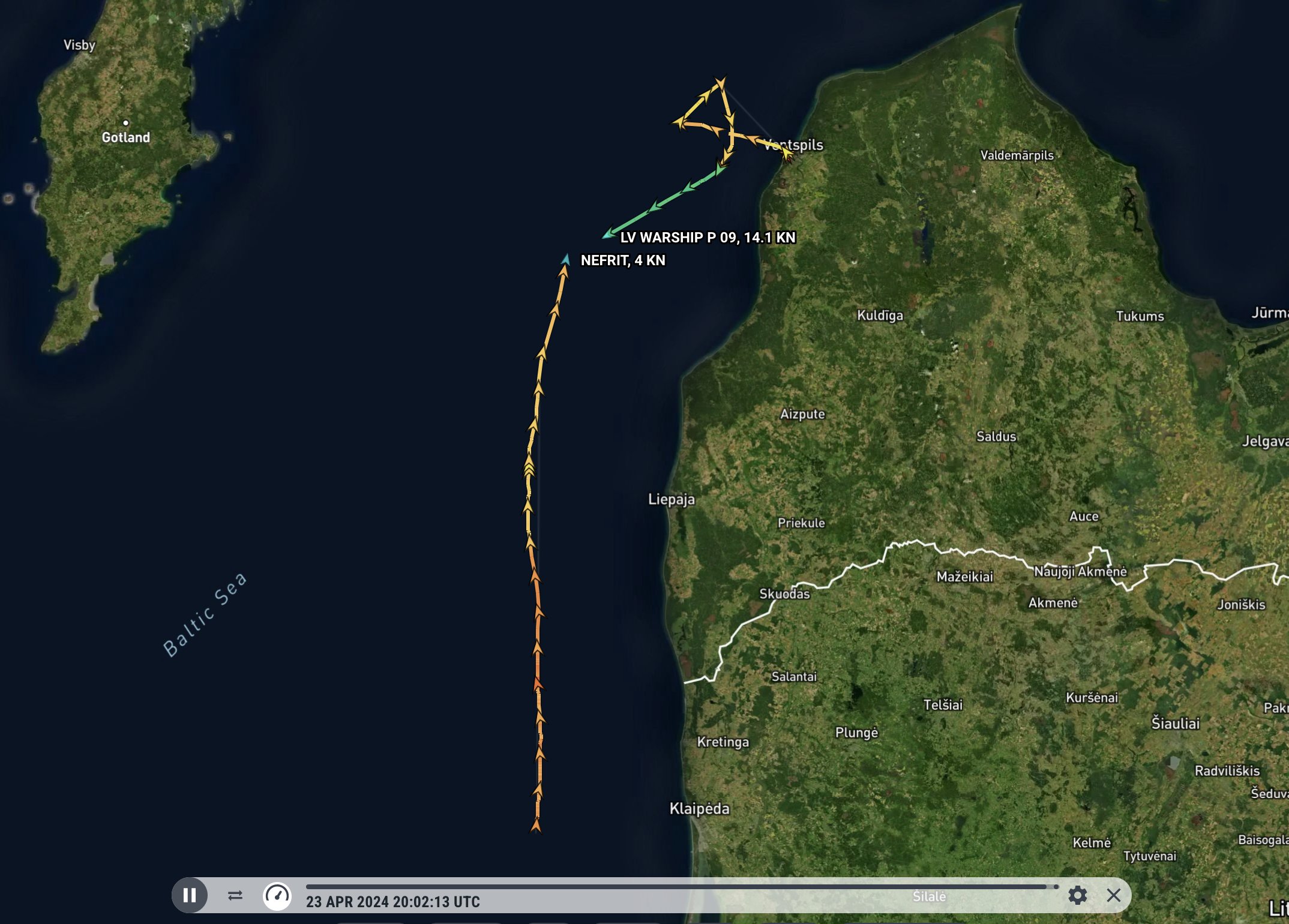
LOL
|
|
|
“If by chance you were to ask me which ornaments I would desire above all others in my house, I would reply, without much pause for reflection, arms and books.”
Baldassare Castiglione https://t.me/arfcom_ukebros |
|
Deckard “nobody wants to know the truth, nobody” Cobra Kai Johnny Lawrence “she’s hot and all those other things” Tucker Carlson 1/10/2018 “I used to be a liberatarian until Google”https://mobile.twitter.com/Henry_Gunn
|
|
Originally Posted By DKUltra: Dont forget Best Korea and Cuba They likey the pootin xi cum mustache bigtime Eta: In before GD'd resident pootin Ball Fondlers! View Quote Welcome Sir! Indeed, Best Korea and Cuba are fair topics as proxies. Not much going on in Cuba right now, but BK is certainly a player in the Ukraine war. |
|
|
|
|
Deckard “nobody wants to know the truth, nobody” Cobra Kai Johnny Lawrence “she’s hot and all those other things” Tucker Carlson 1/10/2018 “I used to be a liberatarian until Google”https://mobile.twitter.com/Henry_Gunn
|
|
Fentanyl and similar synthetic opioids manufactured in China are on the market, behind which is the participation of "wholly state-owned" enterprises
More than ten years ago, Sammy (pseudonym) left her hometown in Sichuan and went to university in northern China, becoming the first college student in her family. She majored in English and dreamed of becoming a teacher. She had never heard of synthetic opioids. After graduation, Sammi found a job at a chemical company in Shijiazhuang, Hebei, selling what she thought were chemical products to customers around the world. She practices English every day, communicates with customers online, and earns commissions for every sale she completes. Her dream of teaching quickly receded. "Maybe others are like me... We didn't know what we were selling at first, but when we found out, we fell in love with the job," she said. "It's quite lucrative. " Sammy doesn't look like a traditional drug trafficker. International law enforcement agencies estimate that there may be thousands of online salespeople working for China's illicit pharmaceutical and chemical companies that produce and smuggle drugs illegally manufactured in laboratories. The U.S. government has long accused China of exporting large quantities of deadly drugs such as fentanyl to the U.S., but the Chinese government denies this. Fentanyl is a synthetic opioid 50 times more potent than heroin. The United States says synthetic opiates manufactured in China are causing the worst drug crisis in U.S. history. The Chinese government has always denied these accusations. In 2022, more than 70,000 Americans died from fentanyl overdoses. According to a report by the U.S. House of Representatives Select Committee on the Chinese Communist Party, the Chinese government provides subsidies to companies that openly sell illegal synthetic drugs. The report found tens of thousands of posts online advertising illegal drugs and pre-cursors. The research report stated that "wholly state-owned" enterprises were involved in drug smuggling. The Chinese government has always denied any knowledge of this illegal drug trade. Many people, like Sammy, appear to be unintentionally involved in the drug trade. They initially had no idea what they were selling online and its deadly consequences, but some knew exactly what they were selling. Every morning, Sarah (pseudonym) posts photos and videos on social platforms to promote drugs, including synthetic cannabinoids, the precursor to MDMA, and nitazenes, also known as "Frankenstein." ). The latter is a synthetic opiate drug that is even 50 times more potent than fentanyl. Sarah graduated from the Department of International Trade and currently works for an online platform. She said: "We have many customers in the UK and have cooperated with them many times." When questioned by reporters, she did not engage in discussions about the ethics of drug trafficking. She says she never asks her customers how they use the products she sells. The National Crime Agency believes drug dealers are mixing synthetic opioids with street drugs such as heroin. Authorities say more than 100 deaths have been linked to nitazenes in the past nine months, leading health professionals to warn the UK may be facing a drugs crisis. The BBC found hundreds of ads for isonitraze online. Some suppliers claimed to send goods by express delivery, but would put other labels on the goods and hide the drug in fake packaging. The "BBC" also saw express tracking numbers provided by Chinese online salesmen, who said they had successfully delivered goods across the UK. Sarah entered the industry right out of college and has been working for two and a half years, thinking she was selling chemicals. "I know most of the products," she said. "My boss has been running this company for more than seven years. He knows many customers and freight forwarders. If the product is detained, he will suffer the most, so he will do his best to make the product reach you smoothly." In March this year, the British government classified 15 synthetic opioids as Class A drugs. Under the country's Misuse of Drugs act, those who supply or produce drugs can be jailed for life, and those who possess drugs can be jailed for seven years. According to the United Nations Office on Drugs and Crime (UNODC), there are 40,000 to 100,000 pharmaceutical companies in China. At the end of 2023, Jeremy Douglas, the office's then regional representative, said: "For a long time, the most important pharmaceutical industry and one of the largest chemical industries in Asia has been in China. We see other countries in the region The industry is also growing.” "Although both industries are regulated, regulation is difficult because of the scale and the many ways in which products are shipped. Parcel mail, air freight and sea containers all move in large quantities around the world." Douglas said synthetic drugs were disrupting the traditional drug trade. Outside of China, synthetic drugs offer opportunities for traditional criminal organizations, as well as for upstarts to source directly from manufacturers on the other side of the world. "Compared with traditional drugs, synthetic drugs (such as fentanyl) have several advantages - they are small, easy to transport, there is an existing demand, and they are replaceable. They are attractive to drug traffickers." The "BBC" reporter confirmed this statement after contacting a salesperson from a Chinese pharmaceutical company. Sarah said: "First of all, our packaging is completely confidential, no one knows what it is until you open the packaging. Secondly, we will change the name of the packaging and will not reveal any name of the product." She added: "We will get the logistics order number when sending the package. We will track the package at any time. Any abnormalities can be known and resolved in time." According to Europol, China is the world’s largest producer and seller of laboratory-synthesized drugs. Some of them mimic the effects of traditional drugs like marijuana or cocaine. Chemists synthesize new drugs to stay one step ahead of the law. Dr. Louis Shirley, director of the Center on Terrorism, Transnational Crime and Corruption (TraCCC) at George Mason University and author of "Dark Business" said: "This is a criminal entrepreneurship, but it is conducted within a legal framework. Indeed, It’s unique.” "I haven't seen this kind of professionalism and corporate element associated with this (industry) anywhere else in the world. Criminal activity brings social mobility." In 2020, TraCCC studied more than 350 English-language websites promoting the synthetic opioid fentanyl. Dr. Xie Li said: "Of all the advertisements we found, nearly 40% came from company registration information . The largest center is in Wuhan." Salespeople contacted by the BBC believe that drug dealing is just one part of e-commerce. One salesperson described himself as a "middleman" when someone questioned whether the drugs they were selling were life-threatening. She said: "Someone needs it, someone makes it, and I am just a middleman to let customers know that I have it, and I don't care what they use it for. Later I figured it out, I just need to make money. I don't I don’t care. Everyone has their own needs.” The saleswoman, who boasted customers from Canada to Croatia, provided photos of recent shipments of medicines with labels showing UK addresses. "I didn't know it at first until I went online and translated the product into Chinese," she texted, adding a tearful emoji. Natalie (pseudonym), another seller who mainly sells fentanyl, said: "This industry is very relaxed and you can get higher wages, which attracts a large number of young people." "We source from more than 10 different laboratories, so there is a lot of choice. I have a professional freight forwarder who packs the goods, so the delivery success rate to the UK is very high." At the same time, another supplier claimed to be able to smuggle drugs into the UK hidden in dog food packaging. "You don't have to worry about shipping. We guarantee safe delivery." "We ship large quantities to all over the world every day. Please trust our professional team. We guarantee 100% safe delivery." In 2019, the Chinese government banned all fentanyl-like drugs. In January 2024, China and the United States launched a joint operation to curb the production of fentanyl. "As long as market demand remains high in certain parts of the world, that demand will be met in some way," said Douglas of the United Nations Office on Drugs and Crime. This article is reprinted with the permission of "BBC News Chinese" . The original article was published here . Original title: Fentanyl and similar products: Why is the proliferation of "Made in China" synthetic drugs difficult to contain? https://www.thenewslens.com/article/201784/fullpage |
|
|
“If by chance you were to ask me which ornaments I would desire above all others in my house, I would reply, without much pause for reflection, arms and books.”
Baldassare Castiglione https://t.me/arfcom_ukebros |
|
Originally Posted By CarmelBytheSea: https://www.aljazeera.com/amp/news/2024/3/12/china-iran-and-russia-stage-joint-naval-drills-in-gulf-of-oman https://www.ar15.com/media/mediaFiles/459941/IMG_3346_jpeg-3196393.JPG View Quote Welcome! Thanks for posting. I’d also like to take this opportunity to publicly apologize to you. I made some comments a while back which I don’t believe were justified. I conflated you as a poster with some of the posters which populate your threads, and I believe that was in error. There has never seemed to be a good time to mention it until now. |
|
|
|
|
Deckard “nobody wants to know the truth, nobody” Cobra Kai Johnny Lawrence “she’s hot and all those other things” Tucker Carlson 1/10/2018 “I used to be a liberatarian until Google”https://mobile.twitter.com/Henry_Gunn
|
|
Originally Posted By CarmelBytheSea: Far more than that - Venezuela, South Africa, Burma, Cambodia etc etc View Quote https://www.scmp.com/news/china/diplomacy/article/3260009/south-china-sea-tensions-mount-china-vows-be-cambodias-side-no-matter-what Shit, China might need its own thread  (I keed) EU raid on Chinese company’s offices ‘shocking,’ to undermine European business environment: chamber Without prior notice, enforcement agencies authorized by the European Commission conducted raids at an unidentified Chinese company's offices in Poland and the Netherlands on Tuesday, the Global Times learned from the China Chamber of Commerce to the EU (CCCEU), in what could be a signal of an escalation of EU’s intensified crackdown on Chinese businesses over the alleged subsidy issue. According to the CCCEU, during the raids, law enforcement agencies seized the company's IT equipment and employees' mobile phones, scrutinized office documents, and demanded access to pertinent data. The CCCEU expressed serious concern and strong dissatisfaction over the EU conducting unjustifiable raids on the Chinese company’s subsidiaries in the EU, noting the “raid was conducted without prior notice and without solid evidence.” Tuesday’s probe came as the EU had published two summary notices pertaining to the second and third in-depth investigations under the FSR, which involved Chinese businesses. The EU's recent intensified measures directed at Chinese companies involved in wind turbines, solar panels, and medical devices, alleging they've benefited from state subsidies, can be seen as protectionist moves, which seek to shield EU businesses while addressing the perceived competitive advantage of certain Chinese firms, experts said. The Chinese chamber said that they are “extremely shocked at and dissatisfied with Tuesday’s inspection.” The suspicions of subsidies can be followed by reasonable means of investigation. However, the European side manifested its intention to weaponize the Foreign Subsidies Regulation (FSR) as a tool to suppress lawfully operating Chinese companies in Europe, the chamber said. During the last two months, the EU has initiated four investigations under the FSR, all targeting Chinese firms. Enacted in January 2023, the FSR has become a tool frequently employed by the EU to crack down on Chinese companies. On April 3 alone, the EU launched two probes under the FSR concerning the "potentially market distortive role of foreign subsidies given to bidders in a public procurement procedure." Specifically, the investigation focused on a joint venture comprising ENEVO from Romania and a branch of LONGi from China, as well as subsidiaries of Shanghai Electric Group. This consortium submitted a bid for a solar energy project tender in Romania. On April 9, the EU announced the probe on Chinese wind turbine suppliers to the bloc under the FSR. At a press conference held by the Chinese Ministry of Commerce (MOFCOM) on April 11, ministry spokesperson He Yadong said that the EU cannot hold high the banner of combating climate change with one hand advocating global green cooperation, while wielding the stick of trade protectionism with the other hand, imposing restrictions on normal green technology trade and investment. The EU move is typical protectionism and will seriously affect global efforts to combat climate change and the process of green transformation, damage the confidence of companies from various countries to invest in the EU, and weaken China-EU mutual trust, the spokesperson said. At time of uncertainty, the sudden unannounced raid on the Chinese company will further undermine business environment for foreign companies within the EU, according to the CCCEU. The chamber urged the European side to stop abusing the FSR and effectively safeguard the legitimate rights and interests of foreign enterprises in the EU and provide a genuinely fair and non-discriminatory business environment for all non-EU enterprises. https://www.globaltimes.cn/page/202404/1311163.shtml |
|
|
“If by chance you were to ask me which ornaments I would desire above all others in my house, I would reply, without much pause for reflection, arms and books.”
Baldassare Castiglione https://t.me/arfcom_ukebros |
|
Originally Posted By Capta: Welcome! Thanks for posting. I’d also like to take this opportunity to publicly apologize to you. I made some comments a while back which I don’t believe were justified. I conflated you as a poster with some of the posters which populate your threads, and I believe that was in error. There has never seemed to be a good time to mention it until now. View Quote Appreciate your post 
|
|
|
Deckard “nobody wants to know the truth, nobody” Cobra Kai Johnny Lawrence “she’s hot and all those other things” Tucker Carlson 1/10/2018 “I used to be a liberatarian until Google”https://mobile.twitter.com/Henry_Gunn
|
|
Deckard “nobody wants to know the truth, nobody” Cobra Kai Johnny Lawrence “she’s hot and all those other things” Tucker Carlson 1/10/2018 “I used to be a liberatarian until Google”https://mobile.twitter.com/Henry_Gunn
|
|
Originally Posted By CarmelBytheSea: Yep I was debating if I should post that article, glad you posted it View Quote Glad you're here, bud. Hope things are good. 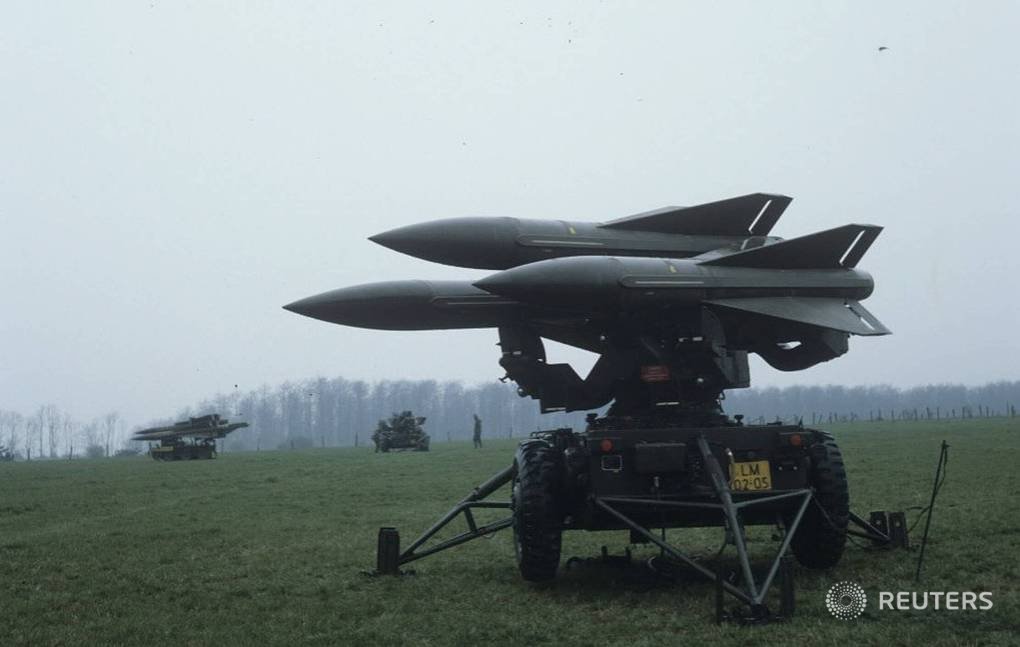
|
|
|
“If by chance you were to ask me which ornaments I would desire above all others in my house, I would reply, without much pause for reflection, arms and books.”
Baldassare Castiglione https://t.me/arfcom_ukebros |
|
THIS POST IS FOR REFERENCE LINKS. WILL CONTINUALLY UPDATE AND ADD TO.
Googledoc page with direct links to Ukrainian brigade telegram channels UA drone munition production part 1 UA drone munition production part 2 UA drone munition production part 3 Central Asia and South Caucasus News Bulletin. Source for news from places like Armenia, Georgia, Kazakhstan, etc. CAPTA’S GREATEST HITS: RUSSIANS GETTING WHAT THEY DESERVE (Assume anything here can be NSFW.) GIBBED. |
|
|
|
|
Originally Posted By Prime: https://www.scmp.com/news/china/diplomacy/article/3260009/south-china-sea-tensions-mount-china-vows-be-cambodias-side-no-matter-what Shit, China might need its own thread  (I keed) EU raid on Chinese company’s offices ‘shocking,’ to undermine European business environment: chamber Without prior notice, enforcement agencies authorized by the European Commission conducted raids at an unidentified Chinese company's offices in Poland and the Netherlands on Tuesday, the Global Times learned from the China Chamber of Commerce to the EU (CCCEU), in what could be a signal of an escalation of EU’s intensified crackdown on Chinese businesses over the alleged subsidy issue. According to the CCCEU, during the raids, law enforcement agencies seized the company's IT equipment and employees' mobile phones, scrutinized office documents, and demanded access to pertinent data. The CCCEU expressed serious concern and strong dissatisfaction over the EU conducting unjustifiable raids on the Chinese company’s subsidiaries in the EU, noting the “raid was conducted without prior notice and without solid evidence.” Tuesday’s probe came as the EU had published two summary notices pertaining to the second and third in-depth investigations under the FSR, which involved Chinese businesses. The EU's recent intensified measures directed at Chinese companies involved in wind turbines, solar panels, and medical devices, alleging they've benefited from state subsidies, can be seen as protectionist moves, which seek to shield EU businesses while addressing the perceived competitive advantage of certain Chinese firms, experts said. The Chinese chamber said that they are “extremely shocked at and dissatisfied with Tuesday’s inspection.” The suspicions of subsidies can be followed by reasonable means of investigation. However, the European side manifested its intention to weaponize the Foreign Subsidies Regulation (FSR) as a tool to suppress lawfully operating Chinese companies in Europe, the chamber said. During the last two months, the EU has initiated four investigations under the FSR, all targeting Chinese firms. Enacted in January 2023, the FSR has become a tool frequently employed by the EU to crack down on Chinese companies. On April 3 alone, the EU launched two probes under the FSR concerning the "potentially market distortive role of foreign subsidies given to bidders in a public procurement procedure." Specifically, the investigation focused on a joint venture comprising ENEVO from Romania and a branch of LONGi from China, as well as subsidiaries of Shanghai Electric Group. This consortium submitted a bid for a solar energy project tender in Romania. On April 9, the EU announced the probe on Chinese wind turbine suppliers to the bloc under the FSR. At a press conference held by the Chinese Ministry of Commerce (MOFCOM) on April 11, ministry spokesperson He Yadong said that the EU cannot hold high the banner of combating climate change with one hand advocating global green cooperation, while wielding the stick of trade protectionism with the other hand, imposing restrictions on normal green technology trade and investment. The EU move is typical protectionism and will seriously affect global efforts to combat climate change and the process of green transformation, damage the confidence of companies from various countries to invest in the EU, and weaken China-EU mutual trust, the spokesperson said. At time of uncertainty, the sudden unannounced raid on the Chinese company will further undermine business environment for foreign companies within the EU, according to the CCCEU. The chamber urged the European side to stop abusing the FSR and effectively safeguard the legitimate rights and interests of foreign enterprises in the EU and provide a genuinely fair and non-discriminatory business environment for all non-EU enterprises. https://www.globaltimes.cn/page/202404/1311163.shtml View Quote Yeah there’s all kinds of shit going down but it’s good to keep it interconnected. I was trying to explain these connections to NATO back in 2013 but was eventually told “we know” but I didn’t see any concrete actions taken. OSCE Ukraine was interested in what I had to say prior to the invasion |
|
|
Deckard “nobody wants to know the truth, nobody” Cobra Kai Johnny Lawrence “she’s hot and all those other things” Tucker Carlson 1/10/2018 “I used to be a liberatarian until Google”https://mobile.twitter.com/Henry_Gunn
|
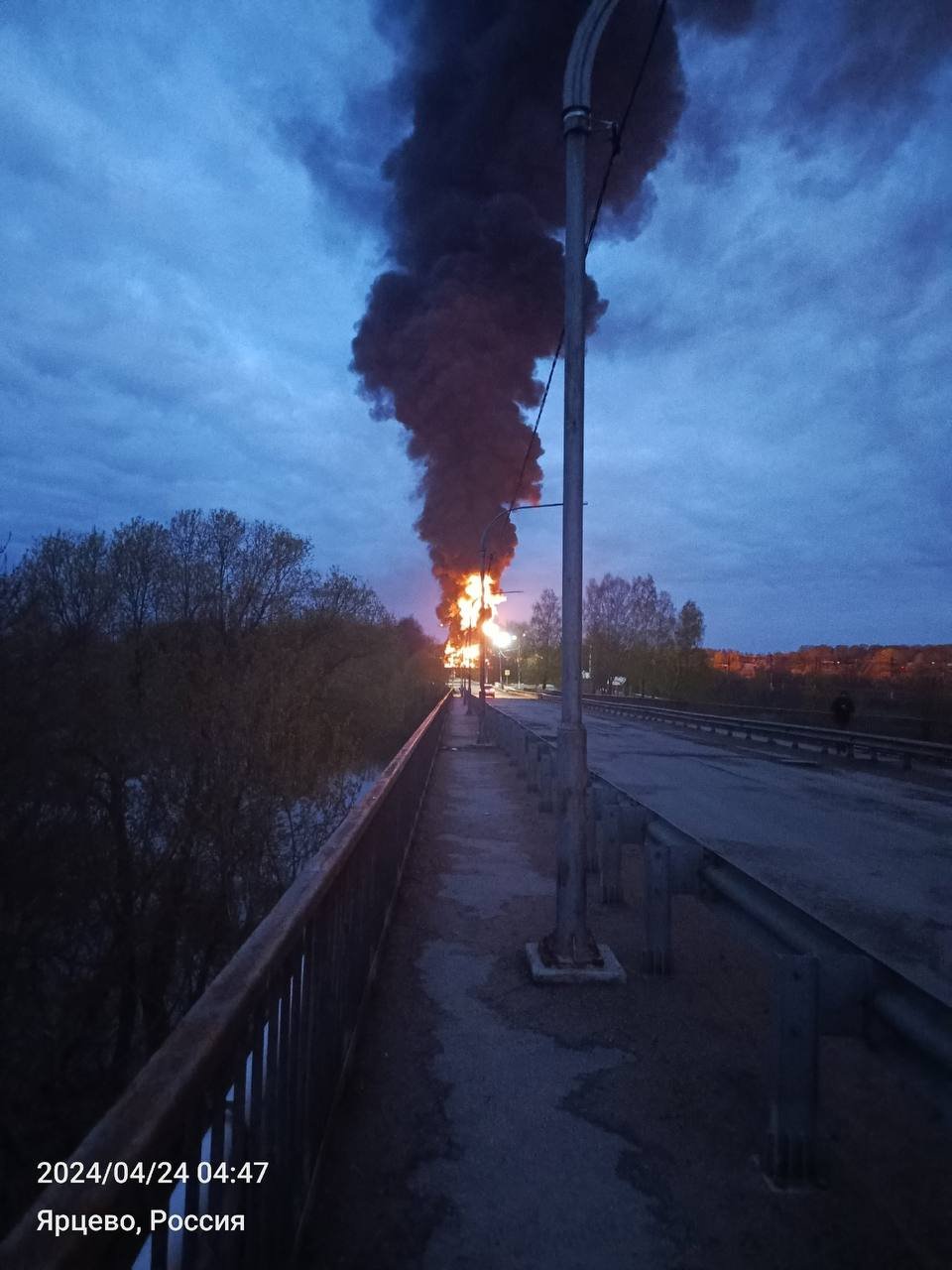
Russian media 
Governor Anokhin Dear Smolensk residents! Our region is again under attack by Ukrainian UAVs. Air defense forces of the Russian Armed Forces are fighting air targets. In all likelihood, as a result of an enemy attack on civilian fuel and energy facilities, fires occurred in the Smolensk and Yartsevo regions. The Ministry of Emergency Situations is eliminating the consequences on the spot. Please remain calm and do not panic. I will inform you further as the situation develops. https://t.me/anohin67/2027 |
|
|
“If by chance you were to ask me which ornaments I would desire above all others in my house, I would reply, without much pause for reflection, arms and books.”
Baldassare Castiglione https://t.me/arfcom_ukebros |
|
Originally Posted By Prime: Glad you're here, bud. Hope things are good. https://pbs.twimg.com/media/GL3DhA6W4AALNqv?format=jpg&name=medium
View Quote  https://www.wsj.com/politics/national-security/u-s-takes-aim-at-chinese-banks-aiding-russia-war-effort-fcf76dcc |
|
|
Deckard “nobody wants to know the truth, nobody” Cobra Kai Johnny Lawrence “she’s hot and all those other things” Tucker Carlson 1/10/2018 “I used to be a liberatarian until Google”https://mobile.twitter.com/Henry_Gunn
|
|
China state news puts out these fluff pieces on how harmonious relations are every other month https://english.news.cn/20240423/007da1a8f1984093b8e7ce642f4cb49c/c.html
|
|
|
Deckard “nobody wants to know the truth, nobody” Cobra Kai Johnny Lawrence “she’s hot and all those other things” Tucker Carlson 1/10/2018 “I used to be a liberatarian until Google”https://mobile.twitter.com/Henry_Gunn
|
|
Winner of Most FPNI 2018, 2022, 2023
|
May all 3 fall into ruin.
|
|
Make Occam's Razor Great Again
It's not about if you win or lose. It's about how many rules they have to add afterwards. |
|
Originally Posted By Capta: Starting off the thread with some longer-format source videos. Some cover particular topics, some provide sources you should follow regularly for excellent coverage of the overall situation, beyond what you might find on the news or even here. I've listened to all of these regularly - highly recommended. First, a series of videos by Dr. Timothy Snyder, expert on Russian and Ukrainian studies. Very, very long college-level class on the History of Ukraine. Extreme commitment of time but also extreme benefit. Doesn't try to oversimplify the situation, presents warts and uncertainties and all. Good listen in your commute for a few weeks or months: The Holodomor - Russian genocide in Ukraine - 1930s on. Does Russia intend genocide in Ukraine? (Yes) Vladimir Putin's relationships with US presidents over his 30-year reign On western dithering/foot-dragging and the serious problems this may create in Ukraine and beyond: Discussion about Russia and the West and their slide away from democracy and toward soft fascism Now, the ongoing series I suggest: Ukraine the Latest. UK source, consistently excellent material, in depth coverage from sources in the EU and NATO. Highly recommended. Silicon Curtain. UK source. One-man podcast, frequently lines up veteran professionals in the European military/security/diplomatic establishments who really know their stuff. Probably more so that Ukraine the Latest, this podcast gets across that the European and global security situation is far more serious than most acknowledge. Doesn't pull many punches. This episode covers the Global instability and insecurity which will come out of the Ukraine war. DWNews. German English-language news. Provides good context for German political decision-making regarding the Ukraine war, occasional China material. Latest episode discusses the European security problems coming out of the Ukraine war. France24. French English-language news. Latest one covers the ongoing arrests of Chinese spies within the EU and German Parliament. Also occasionally covers French interests in Africa. View Quote Timothy Snyder is good to listen to. |
|
|
|
|
Deckard “nobody wants to know the truth, nobody” Cobra Kai Johnny Lawrence “she’s hot and all those other things” Tucker Carlson 1/10/2018 “I used to be a liberatarian until Google”https://mobile.twitter.com/Henry_Gunn
|
|
Chinese state media
"Come over here, China just wants to talk" Japan's military overseas plan raises concerns Effective communication urged to prevent unforeseen circumstances By JIANG XUEQING in Tokyo | China Daily Global | Updated: 2024-04-24 09:28 Japanese scholars and former officials are calling for effective communication between security experts from Japan and China and close exchanges between the governments of the two countries to enhance mutual trust, resolve issues through dialogue, and prevent unforeseen circumstances. The Japan Maritime Self-Defense Force, or JMSDF, recently said it will dispatch a special security unit to the so-called "Indo-Pacific" region in May or later to help the coast guards of those countries enhance their inspections of suspicious ships. Details regarding the destination of the unit and duration of the mission have not been disclosed. This will mark the first time a special unit of SDF provides support for foreign agencies. Ryo Sakai, chief of staff of the JMSDF, emphasized that "while the special security unit possesses a wide range of capabilities, it will provide basic capacity-building support in the coming mission so the dispatch will not cause any concerns or doubts among other countries", said Kazuyuki Hamada, an international political economy scholar. "However, the current situation lacks sufficient explanation. Sakai also explained that there are no military objectives targeting specific countries, but it is undeniable that this deployment is part of defense cooperation with the United States," Hamada said. He noted that the Japanese people bear the burden of history in which they once engaged in armed conflicts with neighboring countries in Asia, resulting in significant damage. Problematic aspects "Considering lessons from the past, Japan should calmly analyze the problematic aspects of the United States' expansionist economic and military policies and aim to pioneer initiatives based on the concept of a community with a shared future for mankind," Hamada added. Ukeru Magosaki, a former senior official with Japan's Ministry of Foreign Affairs, said Japan is currently carrying out joint military actions with the US and countries allied with the US. These are beyond Japan's borders and those of its neighbors, he said, adding that they are taking place in the context of the US positioning China as its greatest competitor and seeking to cooperate with countries surrounding China to establish a cooperative framework. "There used to be a cautious era in the Japanese government regarding such moves, but now it seems that there is hardly any framework for such restrictions," Magosaki said. He added: "In regard to Japan's relationship with China, I believe it is necessary to examine each specific issue that may arise, consider what agreements exist, and assess the potential for resolution through dialogue. Many of these issues are either already resolved or have a high potential for resolution through non-military means." It is important to explain to the public and ensure they understand that there is no need to resort to military means, Magosaki said. On Monday, more than 180 navy representatives from 29 countries gathered for the 19th biennial meeting of the Western Pacific Naval Symposium, which opened in Qingdao, a port city in East China's Shandong province. Risk avoidance measures for accidental conflicts were discussed at the meeting, Hamada said. He said he hopes such opportunities will contribute to enhancing mutual trust. "With effective communication between security experts from Japan and China, it should be entirely possible to prevent unforeseen circumstances," Hamada said. "Therefore, political-level communication channels and close exchanges between governments are indispensable." http://global.chinadaily.com.cn/a/202404/24/WS6628604ba31082fc043c3a7a.html |
|
|
“If by chance you were to ask me which ornaments I would desire above all others in my house, I would reply, without much pause for reflection, arms and books.”
Baldassare Castiglione https://t.me/arfcom_ukebros |
|
Originally Posted By Prime: Chinese state media "Come over here, China just wants to talk" Japan's military overseas plan raises concerns Effective communication urged to prevent unforeseen circumstances By JIANG XUEQING in Tokyo | China Daily Global | Updated: 2024-04-24 09:28 Japanese scholars and former officials are calling for effective communication between security experts from Japan and China and close exchanges between the governments of the two countries to enhance mutual trust, resolve issues through dialogue, and prevent unforeseen circumstances. The Japan Maritime Self-Defense Force, or JMSDF, recently said it will dispatch a special security unit to the so-called "Indo-Pacific" region in May or later to help the coast guards of those countries enhance their inspections of suspicious ships. Details regarding the destination of the unit and duration of the mission have not been disclosed. This will mark the first time a special unit of SDF provides support for foreign agencies. Ryo Sakai, chief of staff of the JMSDF, emphasized that "while the special security unit possesses a wide range of capabilities, it will provide basic capacity-building support in the coming mission so the dispatch will not cause any concerns or doubts among other countries", said Kazuyuki Hamada, an international political economy scholar. "However, the current situation lacks sufficient explanation. Sakai also explained that there are no military objectives targeting specific countries, but it is undeniable that this deployment is part of defense cooperation with the United States," Hamada said. He noted that the Japanese people bear the burden of history in which they once engaged in armed conflicts with neighboring countries in Asia, resulting in significant damage. Problematic aspects "Considering lessons from the past, Japan should calmly analyze the problematic aspects of the United States' expansionist economic and military policies and aim to pioneer initiatives based on the concept of a community with a shared future for mankind," Hamada added. Ukeru Magosaki, a former senior official with Japan's Ministry of Foreign Affairs, said Japan is currently carrying out joint military actions with the US and countries allied with the US. These are beyond Japan's borders and those of its neighbors, he said, adding that they are taking place in the context of the US positioning China as its greatest competitor and seeking to cooperate with countries surrounding China to establish a cooperative framework. "There used to be a cautious era in the Japanese government regarding such moves, but now it seems that there is hardly any framework for such restrictions," Magosaki said. He added: "In regard to Japan's relationship with China, I believe it is necessary to examine each specific issue that may arise, consider what agreements exist, and assess the potential for resolution through dialogue. Many of these issues are either already resolved or have a high potential for resolution through non-military means." It is important to explain to the public and ensure they understand that there is no need to resort to military means, Magosaki said. On Monday, more than 180 navy representatives from 29 countries gathered for the 19th biennial meeting of the Western Pacific Naval Symposium, which opened in Qingdao, a port city in East China's Shandong province. Risk avoidance measures for accidental conflicts were discussed at the meeting, Hamada said. He said he hopes such opportunities will contribute to enhancing mutual trust. "With effective communication between security experts from Japan and China, it should be entirely possible to prevent unforeseen circumstances," Hamada said. "Therefore, political-level communication channels and close exchanges between governments are indispensable." http://global.chinadaily.com.cn/a/202404/24/WS6628604ba31082fc043c3a7a.html View Quote https://www.reuters.com/world/japan-says-it-is-gravely-concerned-about-closer-military-ties-between-china-2024-03-07/ https://news.usni.org/2023/12/14/joint-russia-china-military-flights-prompts-japanese-south-korean-fighter-scrambles |
|
|
Deckard “nobody wants to know the truth, nobody” Cobra Kai Johnny Lawrence “she’s hot and all those other things” Tucker Carlson 1/10/2018 “I used to be a liberatarian until Google”https://mobile.twitter.com/Henry_Gunn
|
|
Look man, no Chinaman, Ruskie or Persian ever called me white supremacy
|
|
|
|
|
"Crashes"
 Drone crashes in industrial zone in Russian city of Lipetsk There were no casualties, Regional Governor Igor Artamonov said MOSCOW, April 24. /TASS/. A drone crashed in an industrial zone in the city of Lipetsk in central Russia, causing no casualties, regional Governor Igor Artamonov said. "A drone crashed in an industrial zone in Lipetsk. There were no casualties. Law enforcement officers are working at the scene," he wrote on Telegram. Earlier, Artamonov announced that an air attack alert had been issued for the region. https://tass.com/emergencies/1779649
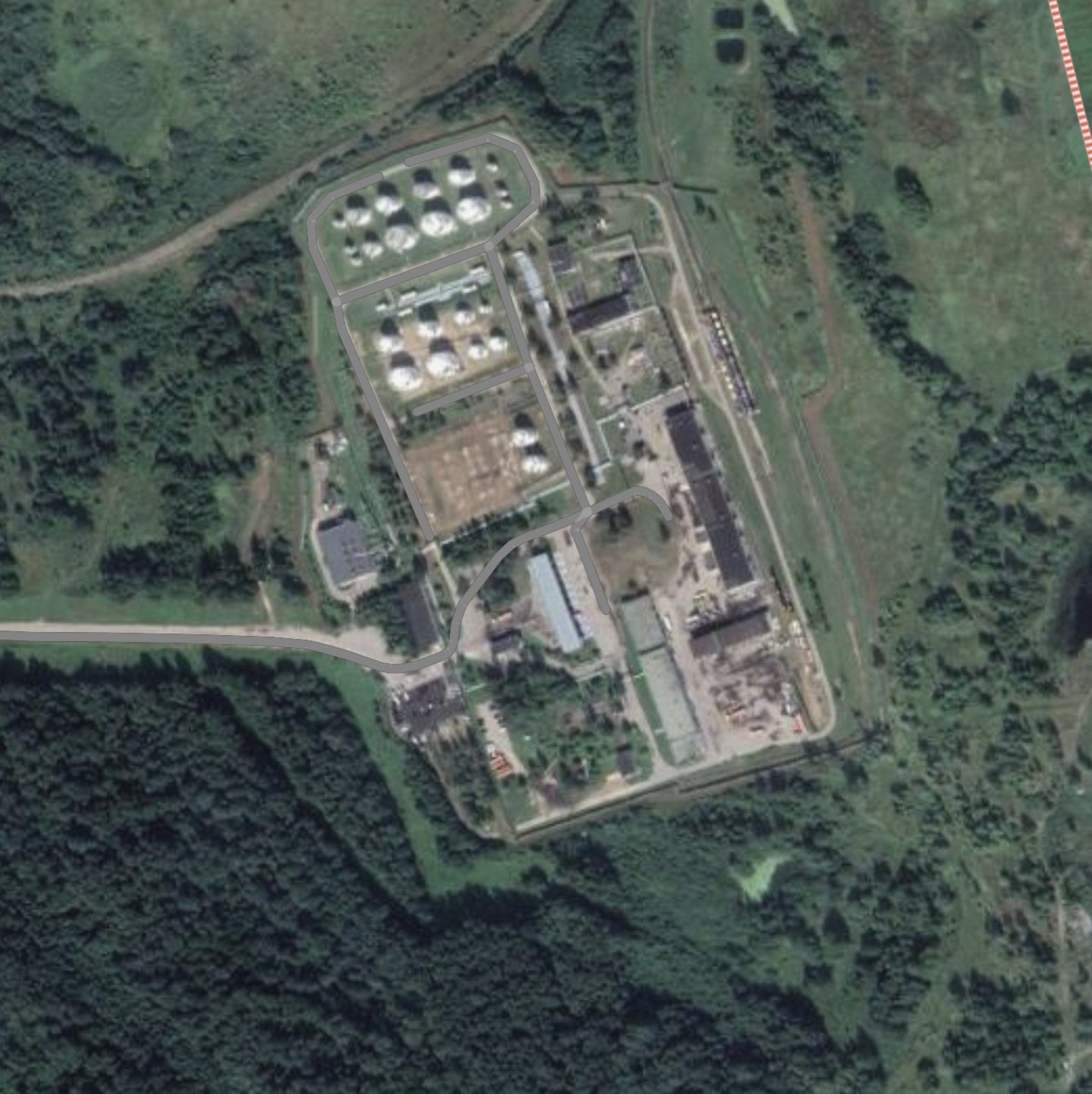 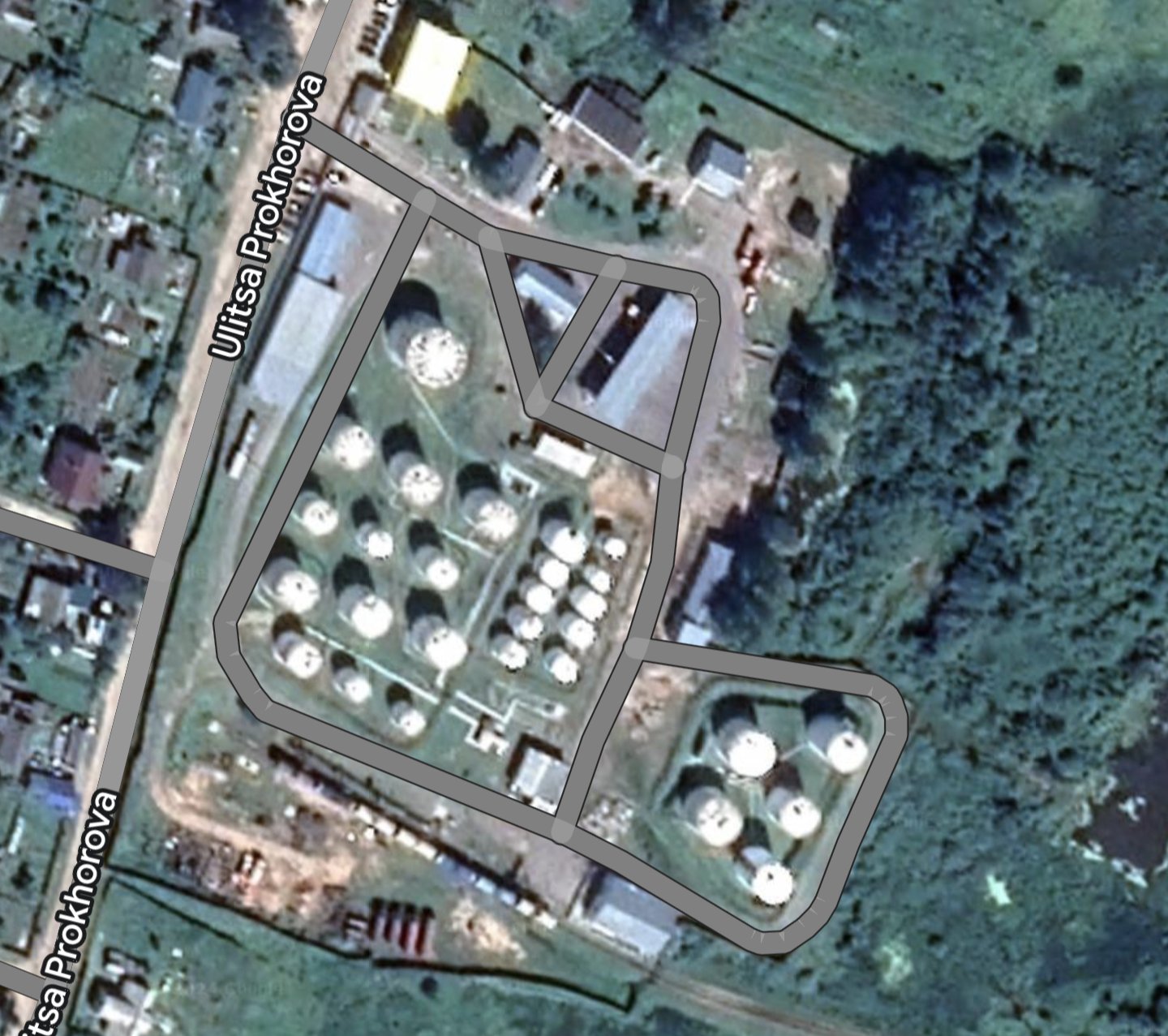
|
|
|
“If by chance you were to ask me which ornaments I would desire above all others in my house, I would reply, without much pause for reflection, arms and books.”
Baldassare Castiglione https://t.me/arfcom_ukebros |
|
Originally Posted By killstick_engaged: Look man, no Chinaman, Ruskie or Persian ever called me white supremacy View Quote Humorously enough, Iran state news and Chinacstate news actually do have articles claiming that. https://en.mehrnews.com/amp/112483/ |
|
|
Deckard “nobody wants to know the truth, nobody” Cobra Kai Johnny Lawrence “she’s hot and all those other things” Tucker Carlson 1/10/2018 “I used to be a liberatarian until Google”https://mobile.twitter.com/Henry_Gunn
|
 Win a FREE Membership!
Win a FREE Membership!
Sign up for the ARFCOM weekly newsletter and be entered to win a free ARFCOM membership. One new winner* is announced every week!
You will receive an email every Friday morning featuring the latest chatter from the hottest topics, breaking news surrounding legislation, as well as exclusive deals only available to ARFCOM email subscribers.
AR15.COM is the world's largest firearm community and is a gathering place for firearm enthusiasts of all types.
From hunters and military members, to competition shooters and general firearm enthusiasts, we welcome anyone who values and respects the way of the firearm.
Subscribe to our monthly Newsletter to receive firearm news, product discounts from your favorite Industry Partners, and more.
Copyright © 1996-2024 AR15.COM LLC. All Rights Reserved.
Any use of this content without express written consent is prohibited.
AR15.Com reserves the right to overwrite or replace any affiliate, commercial, or monetizable links, posted by users, with our own.

